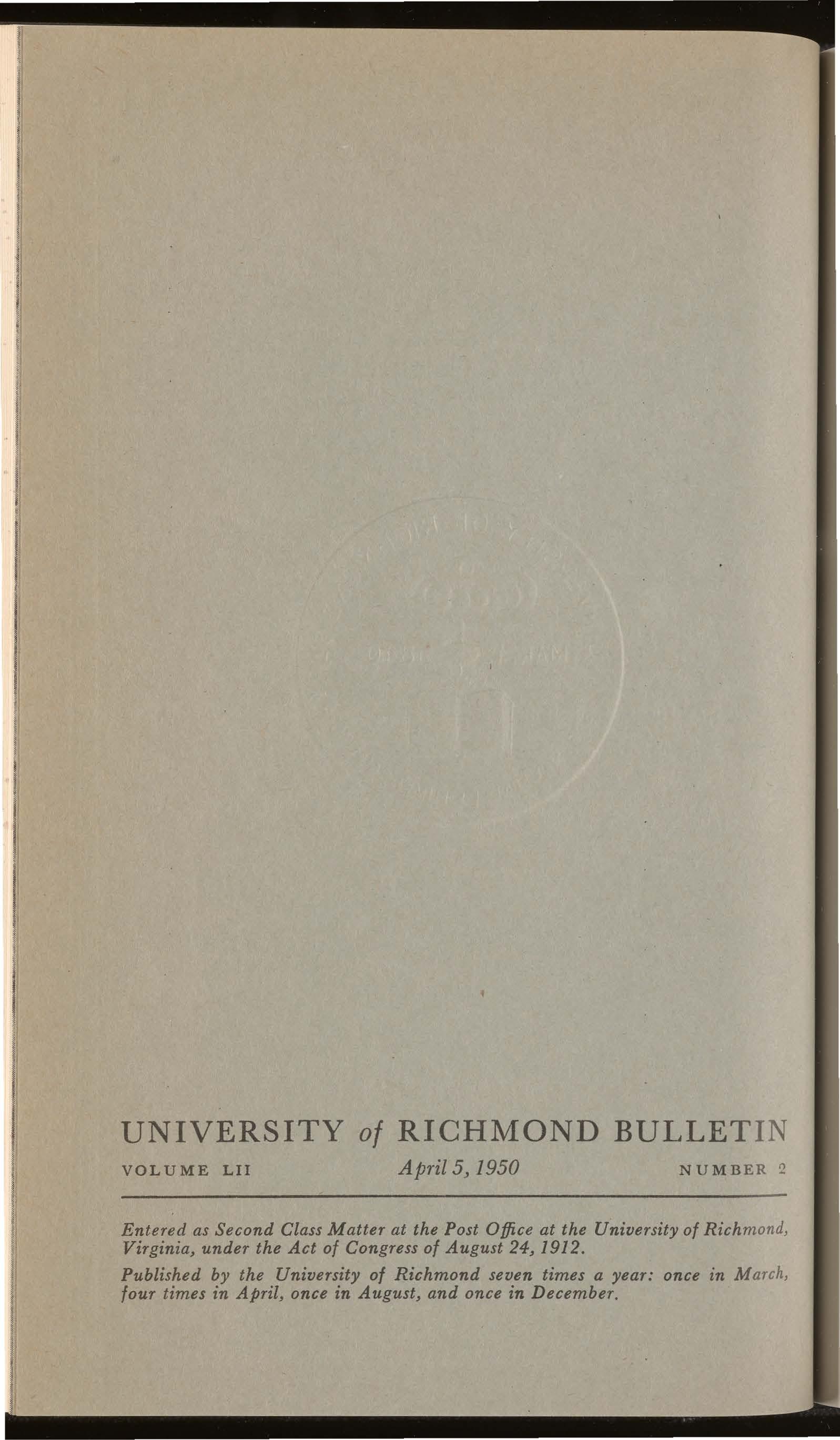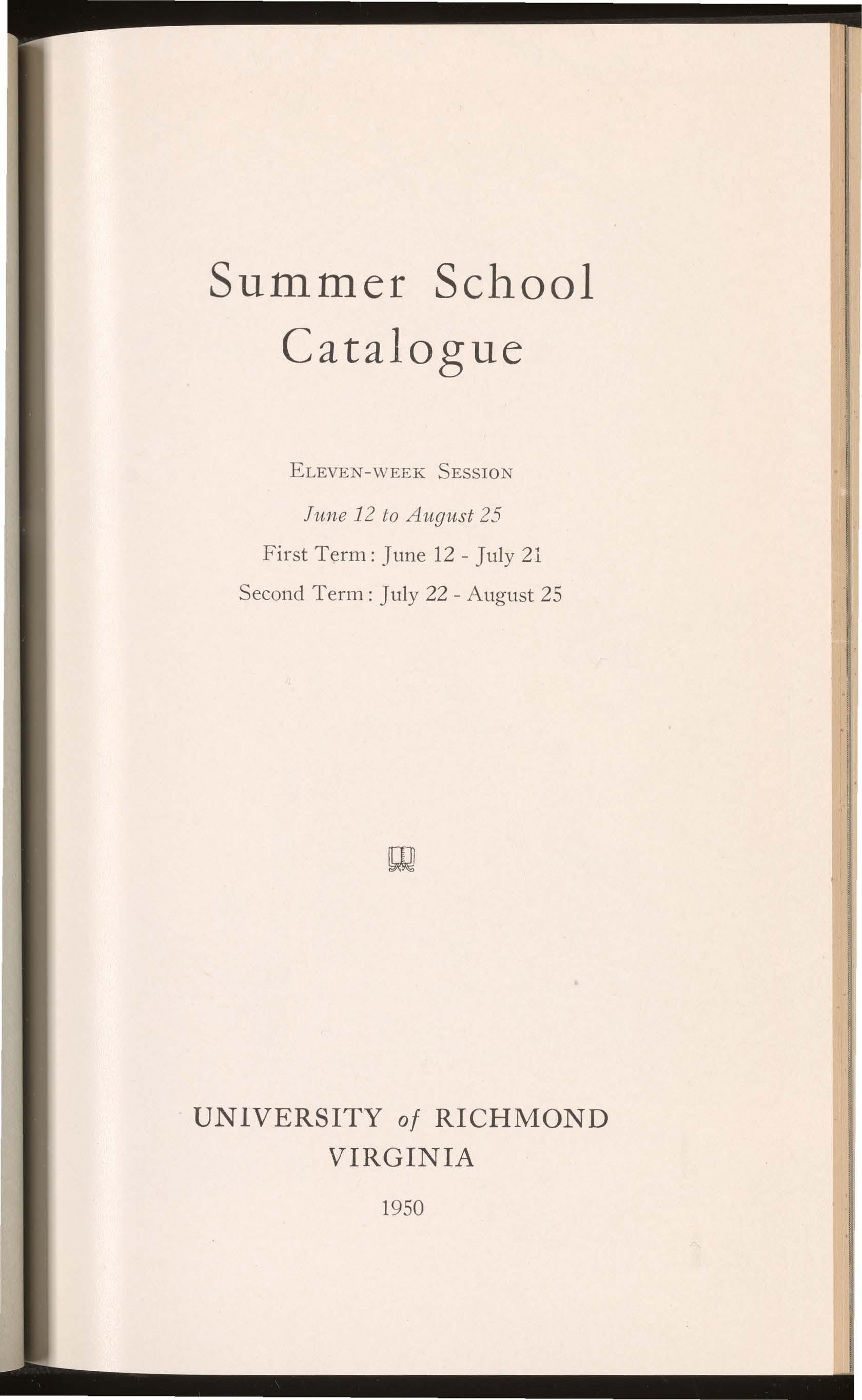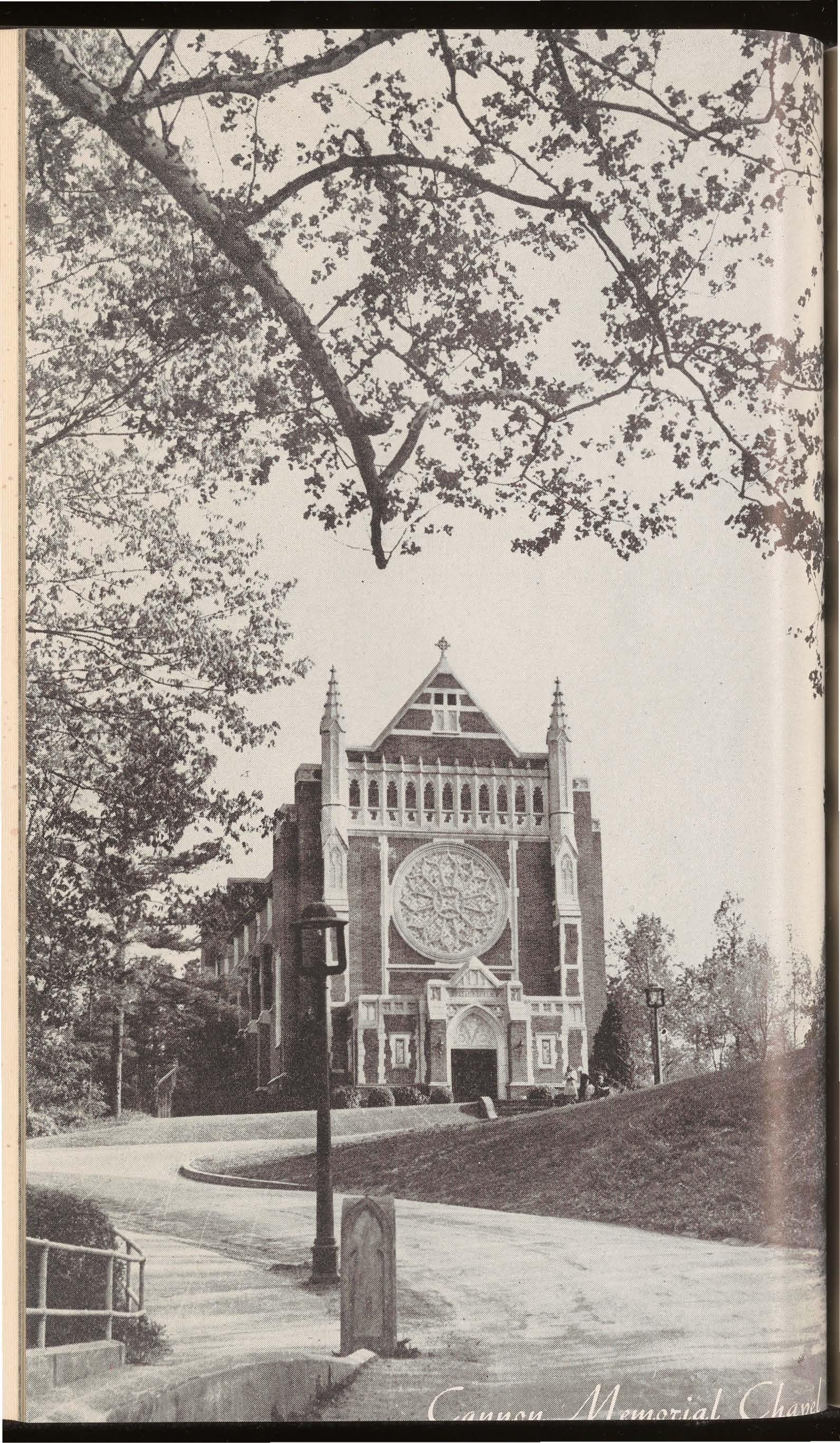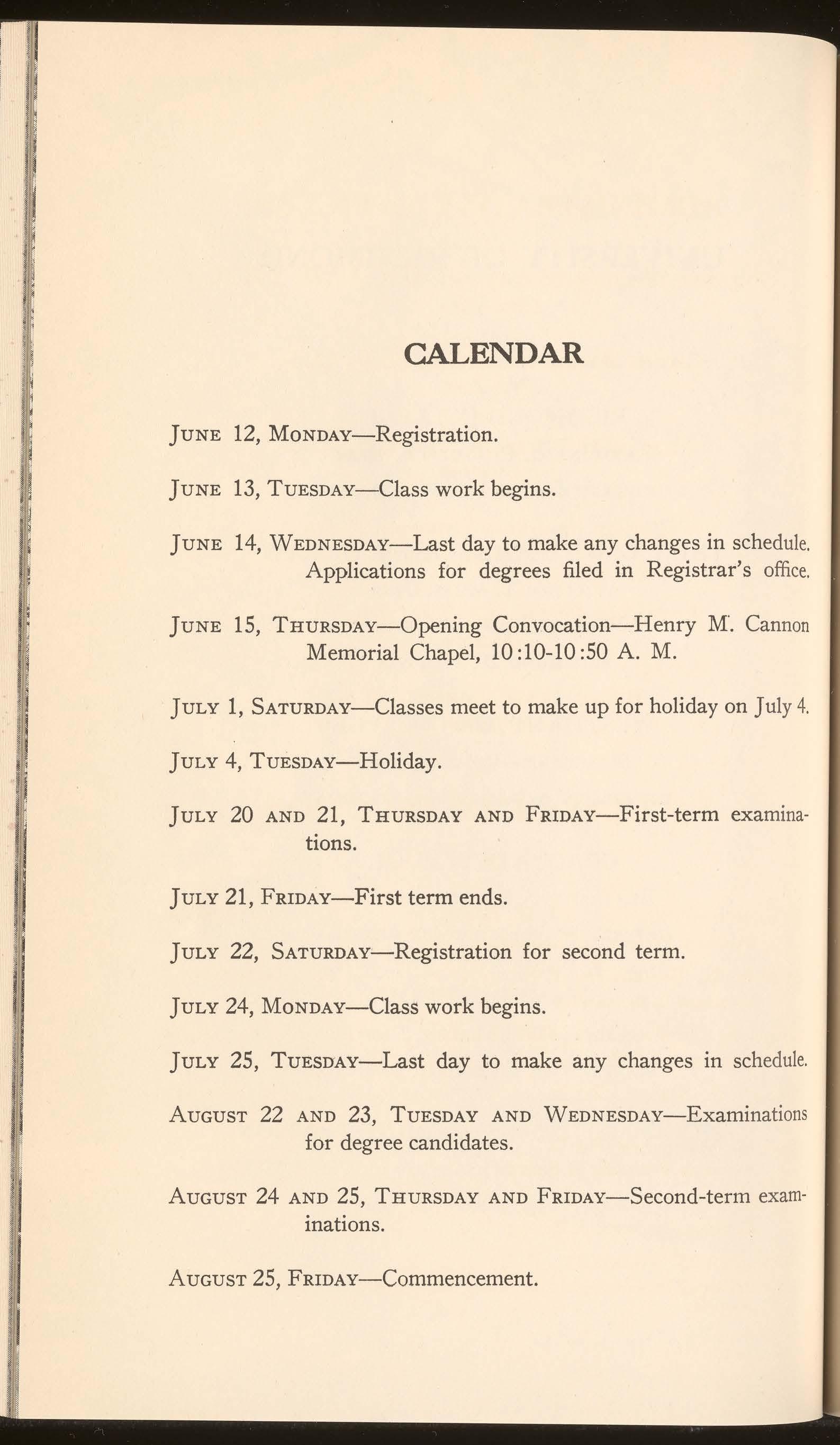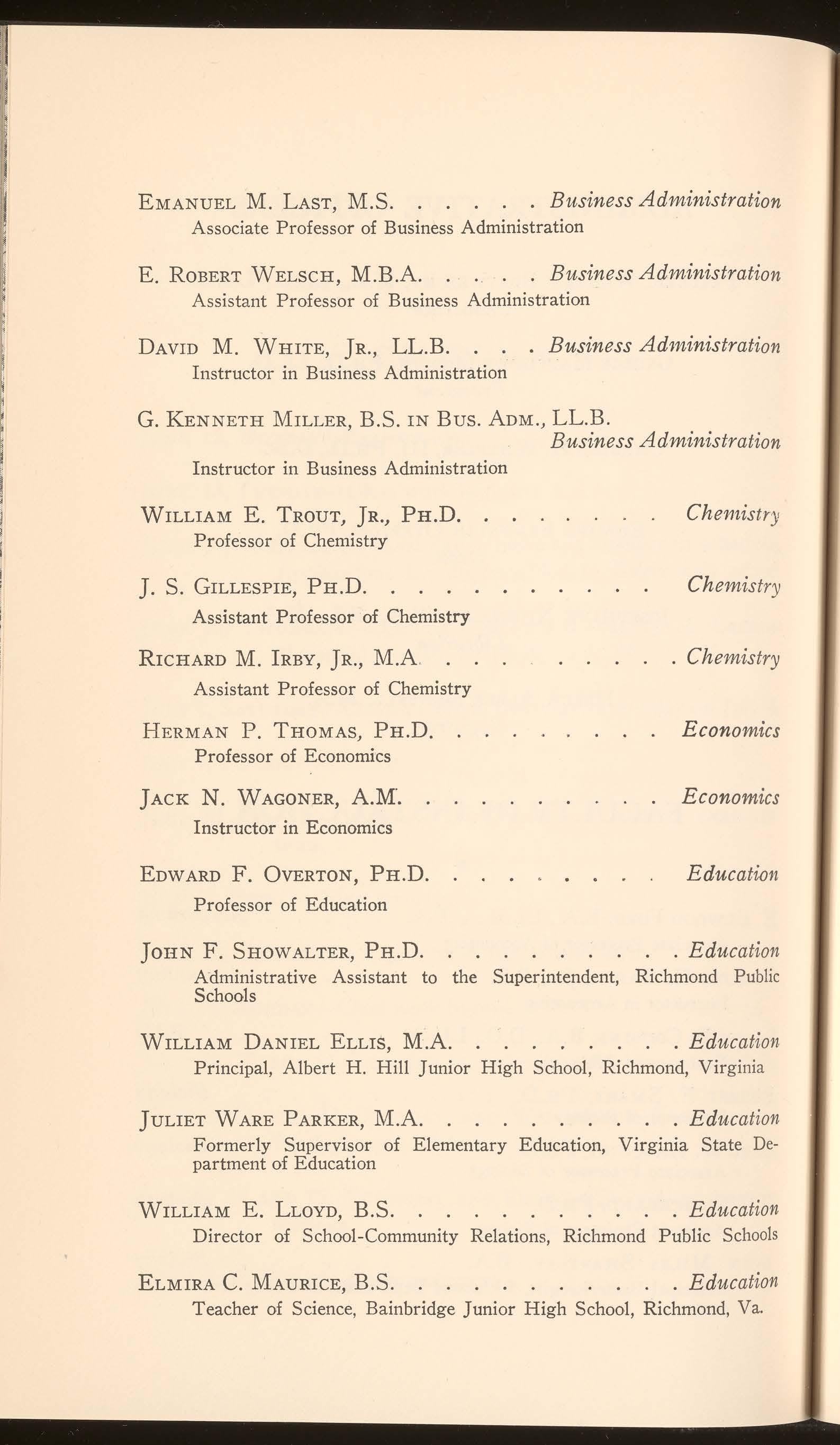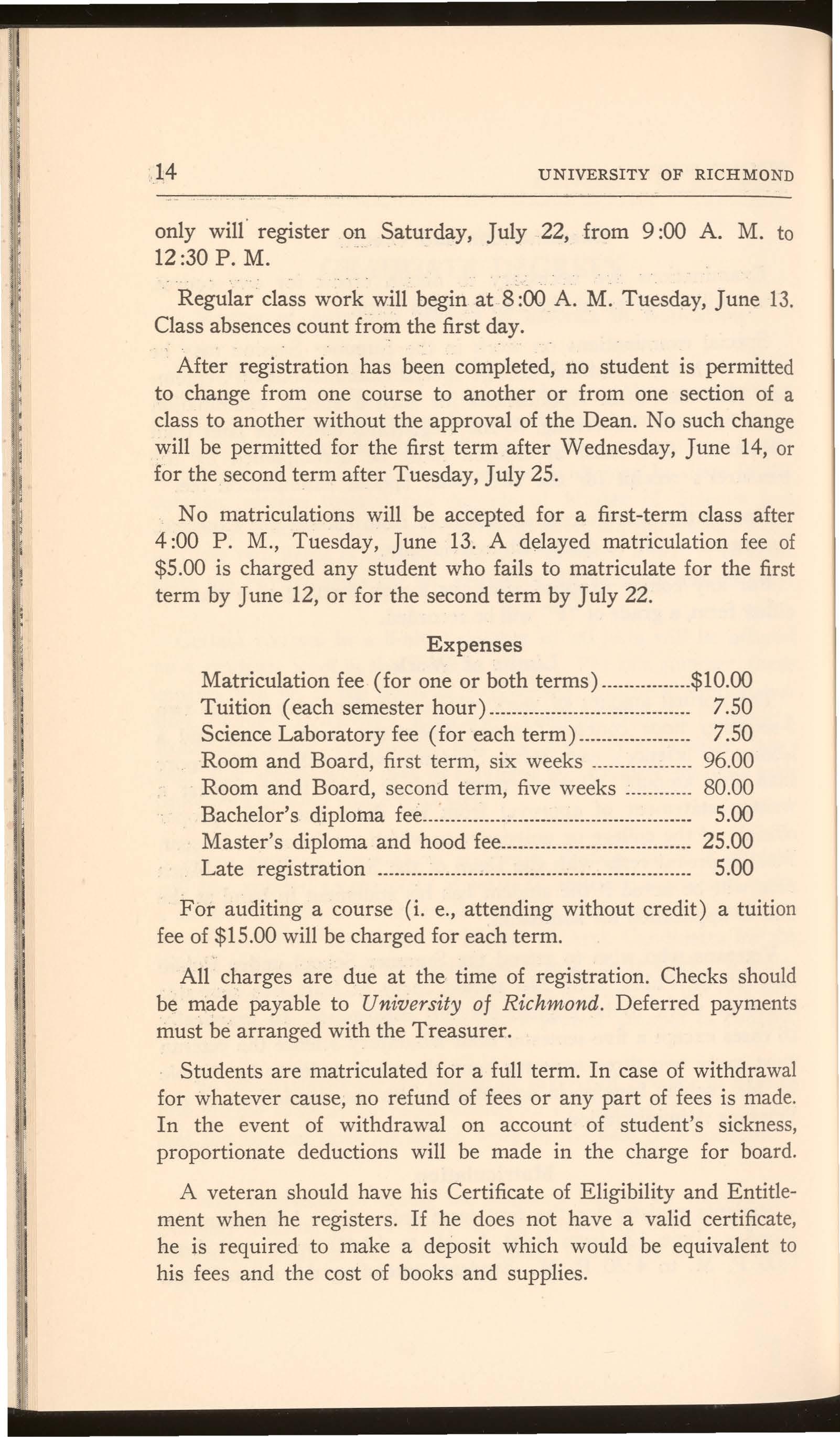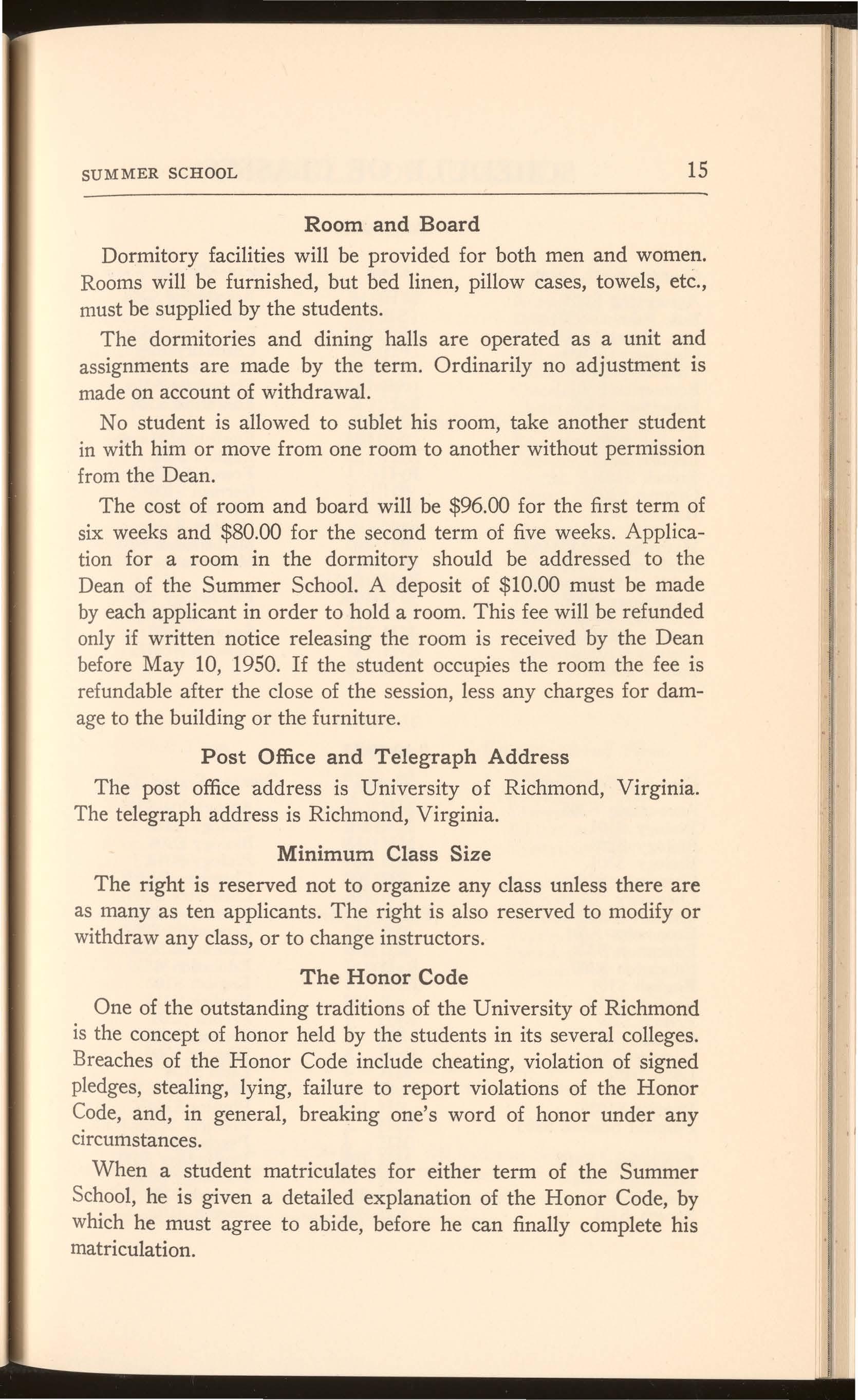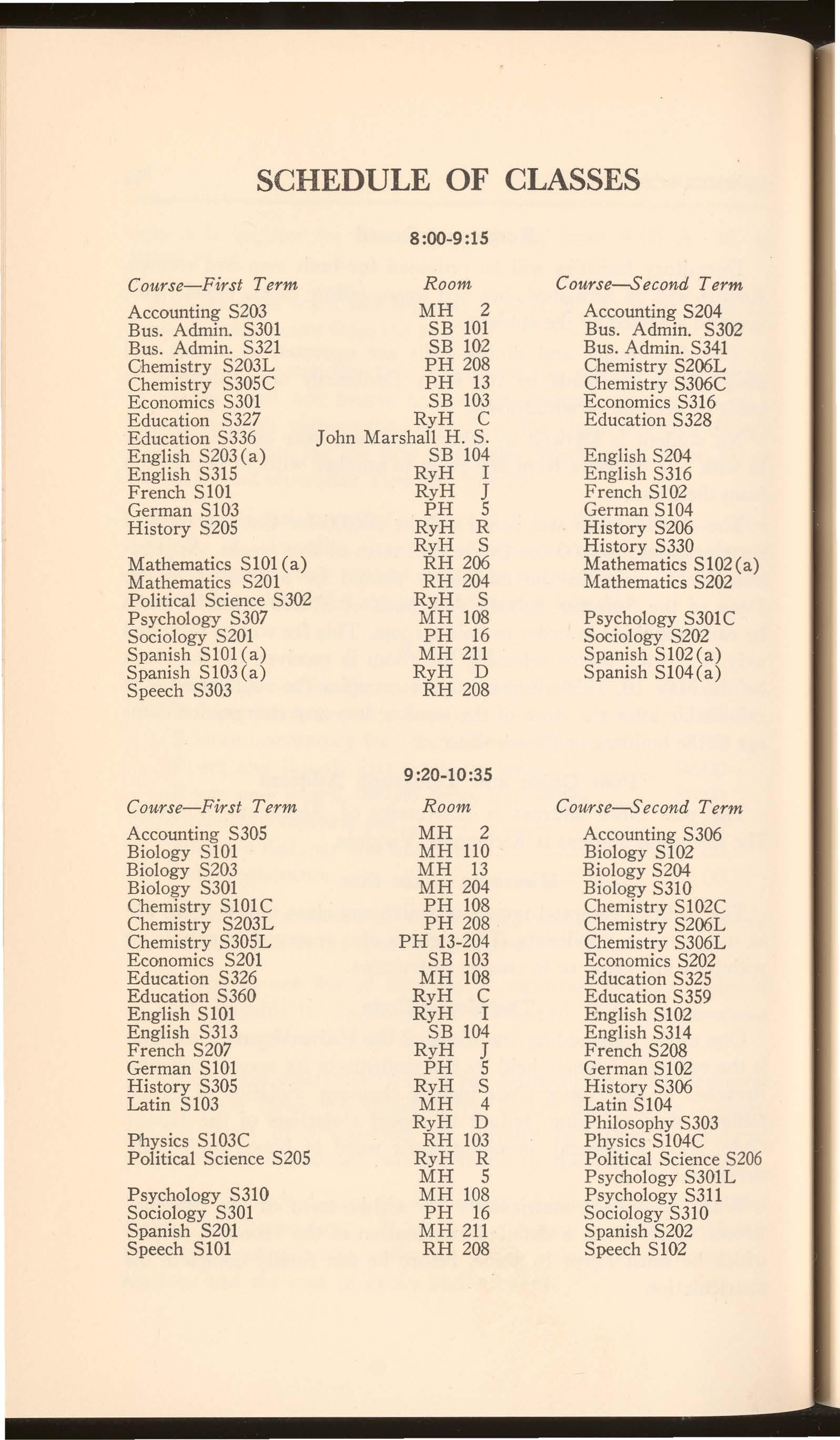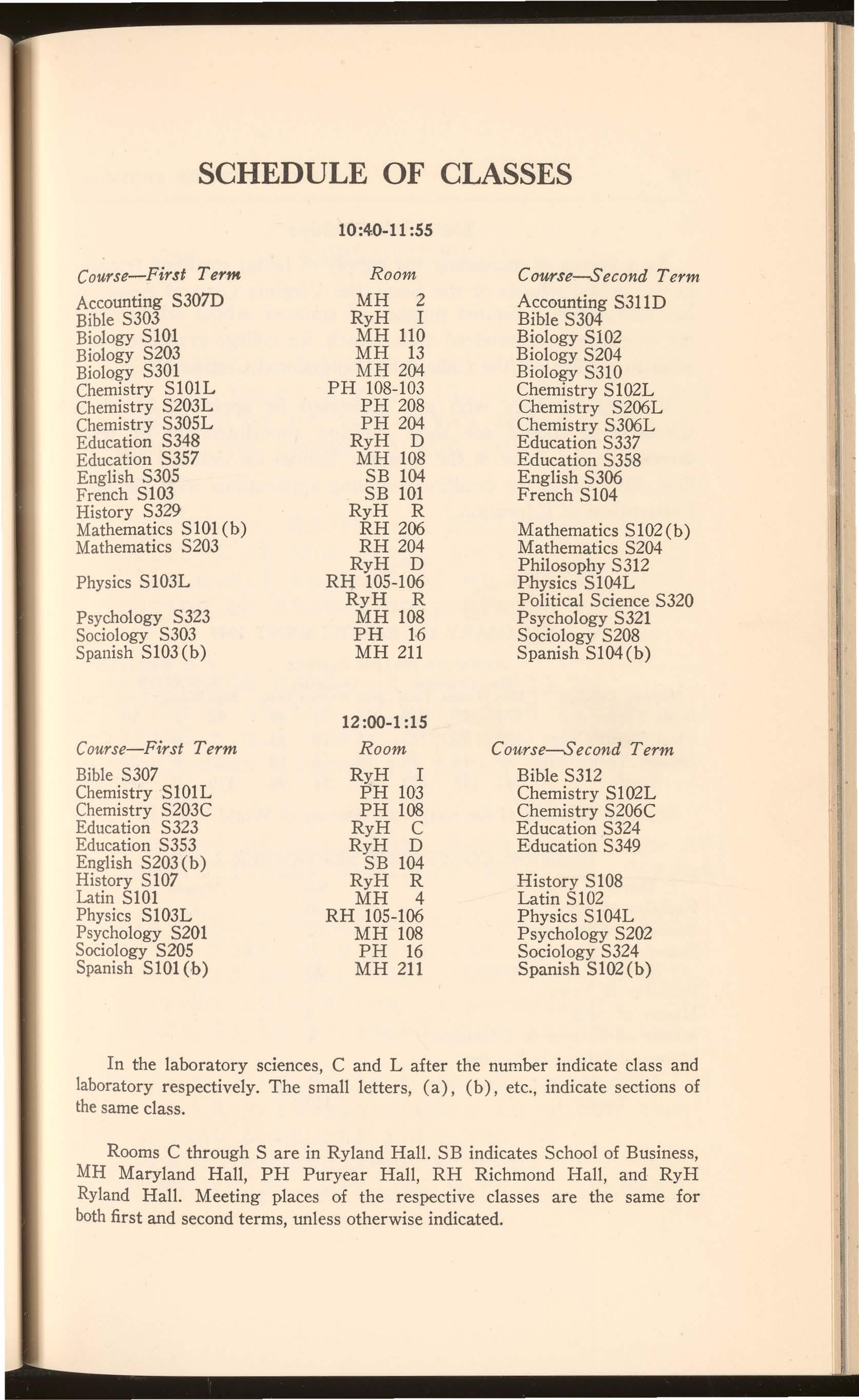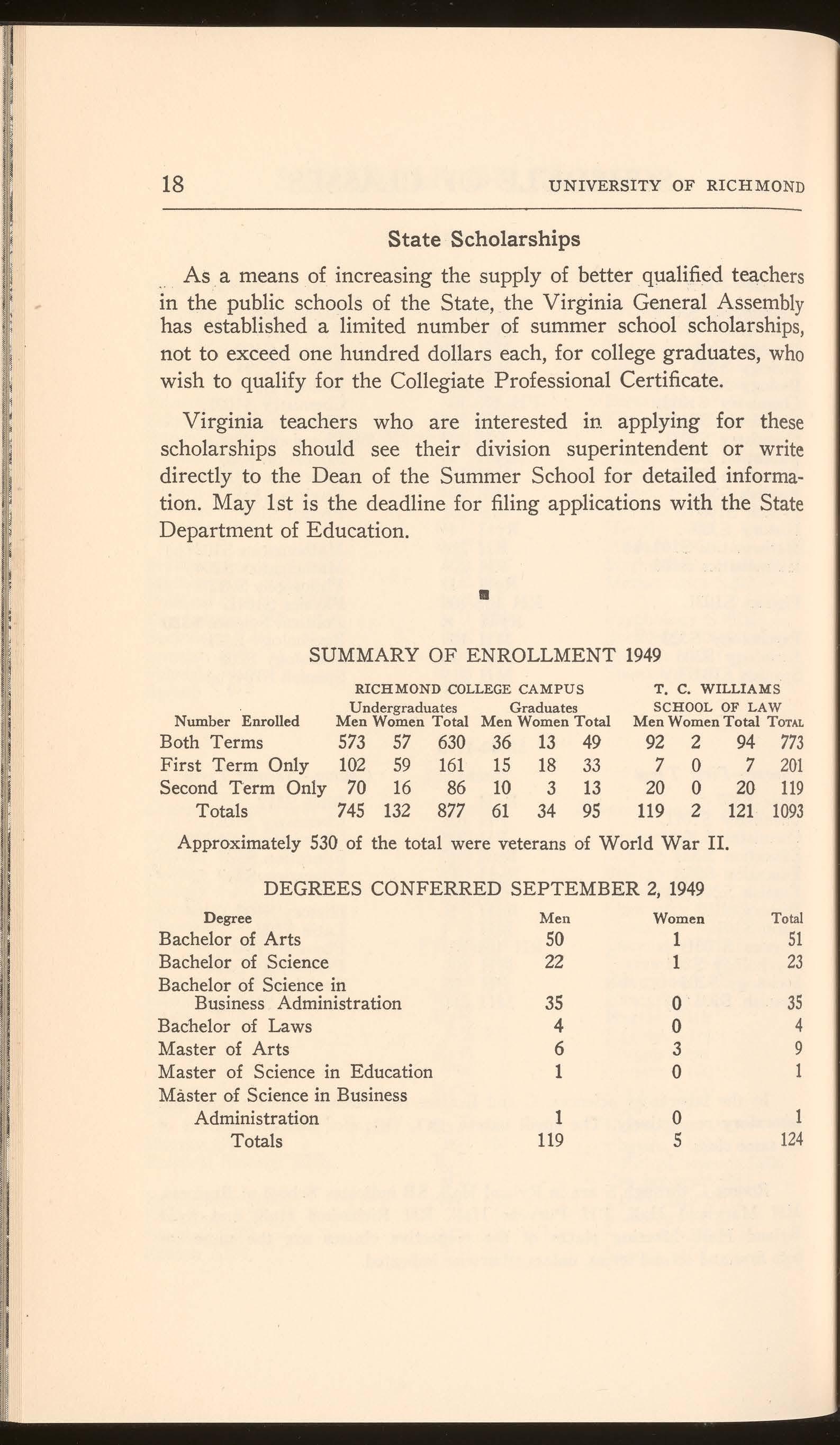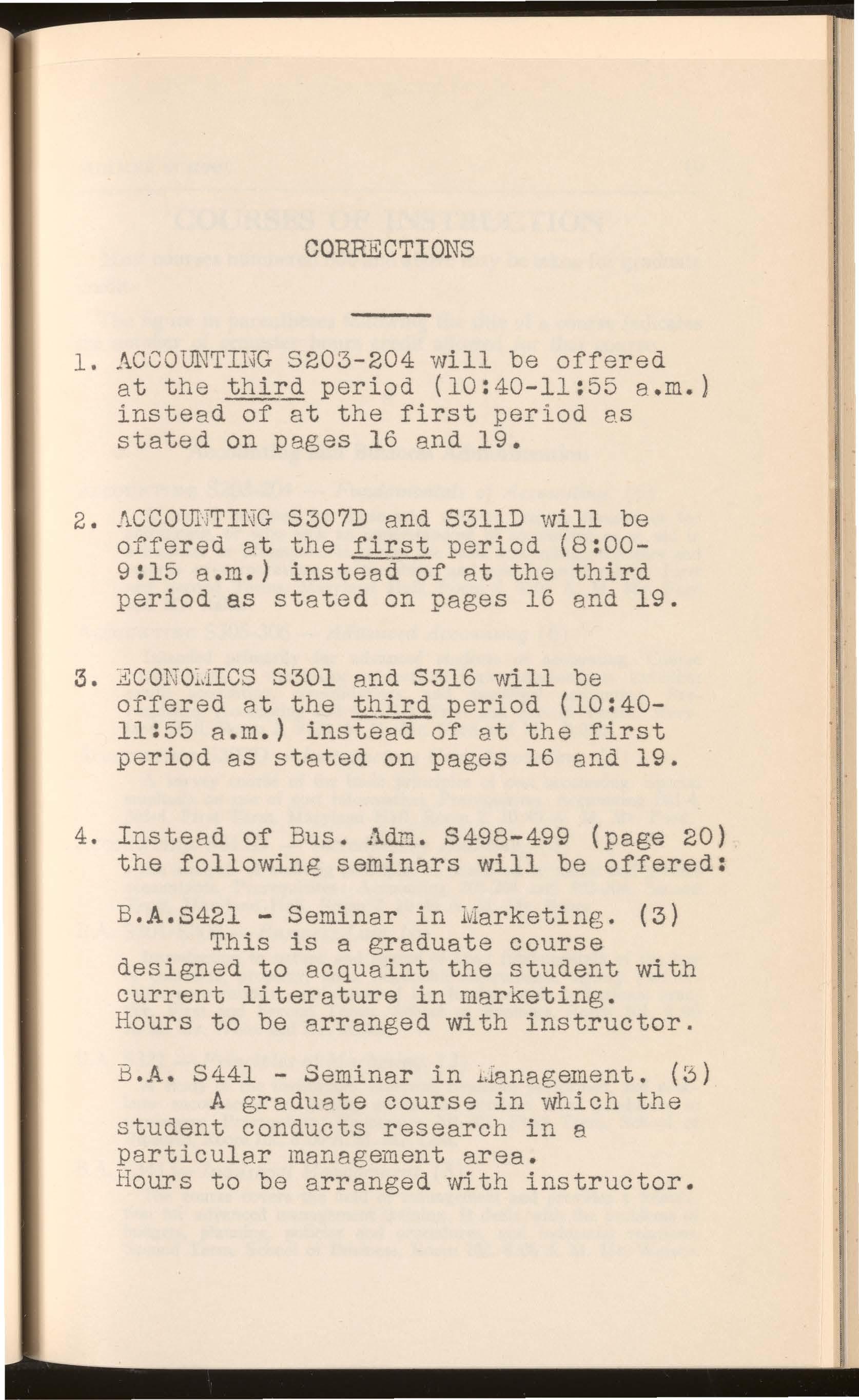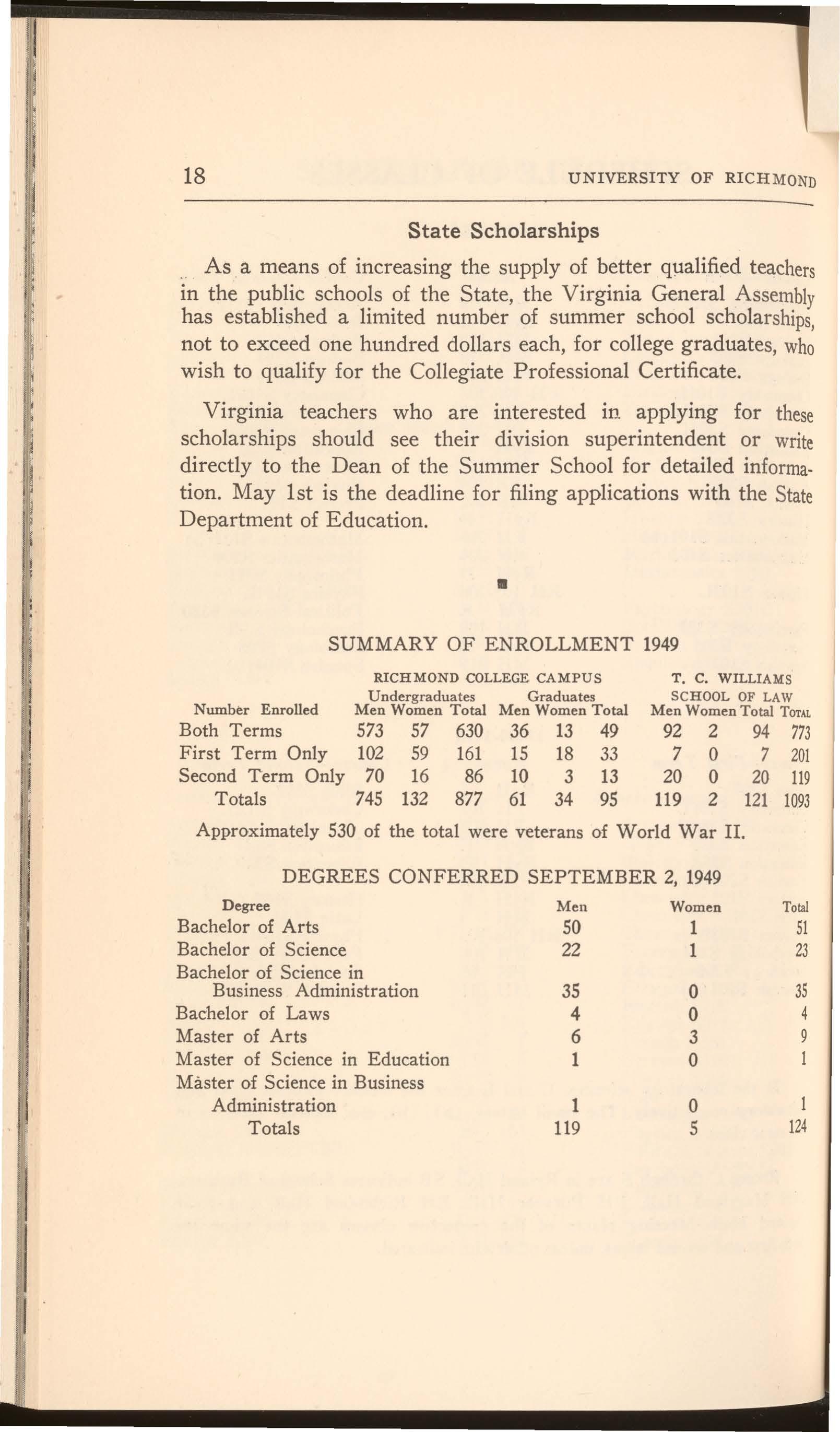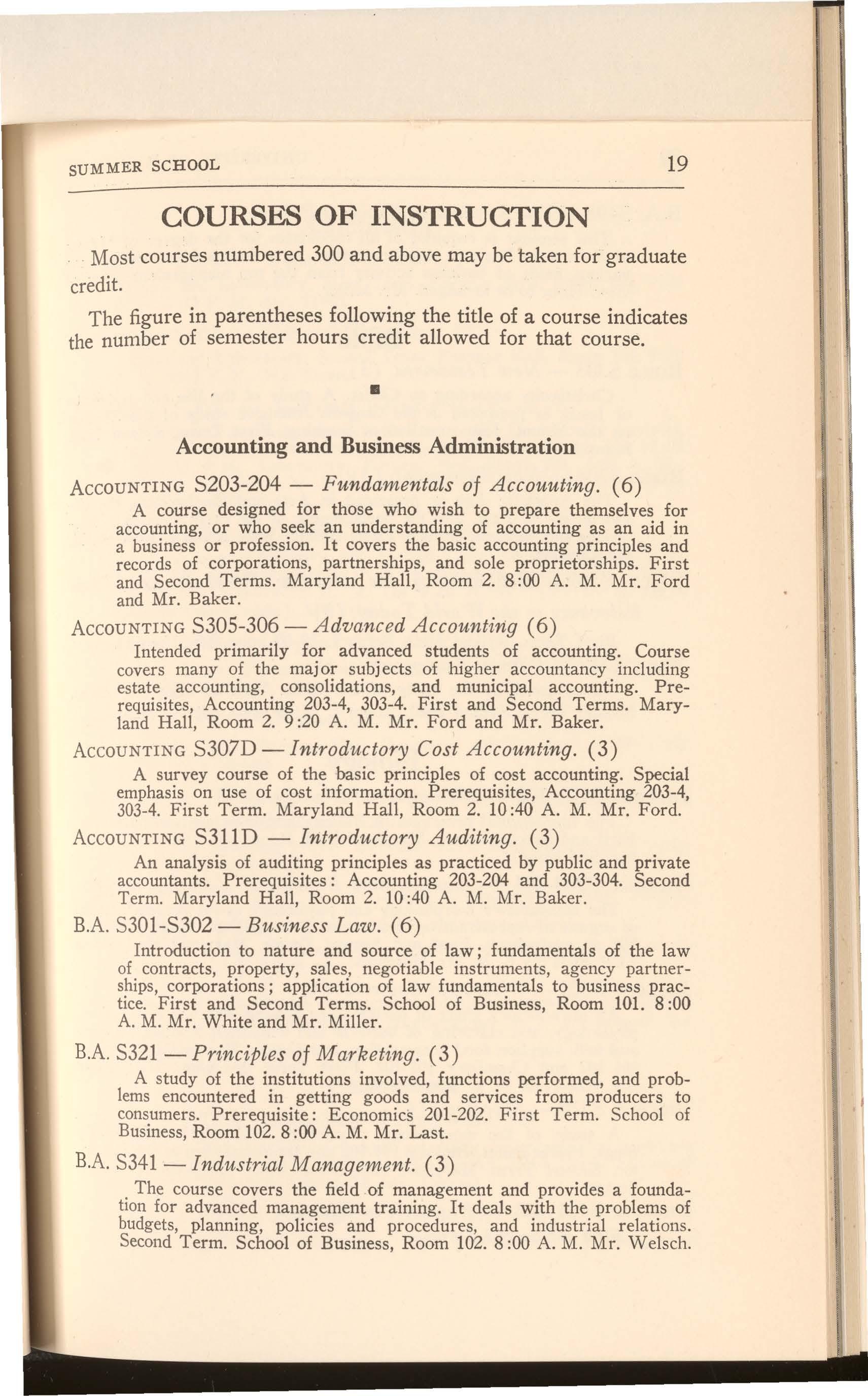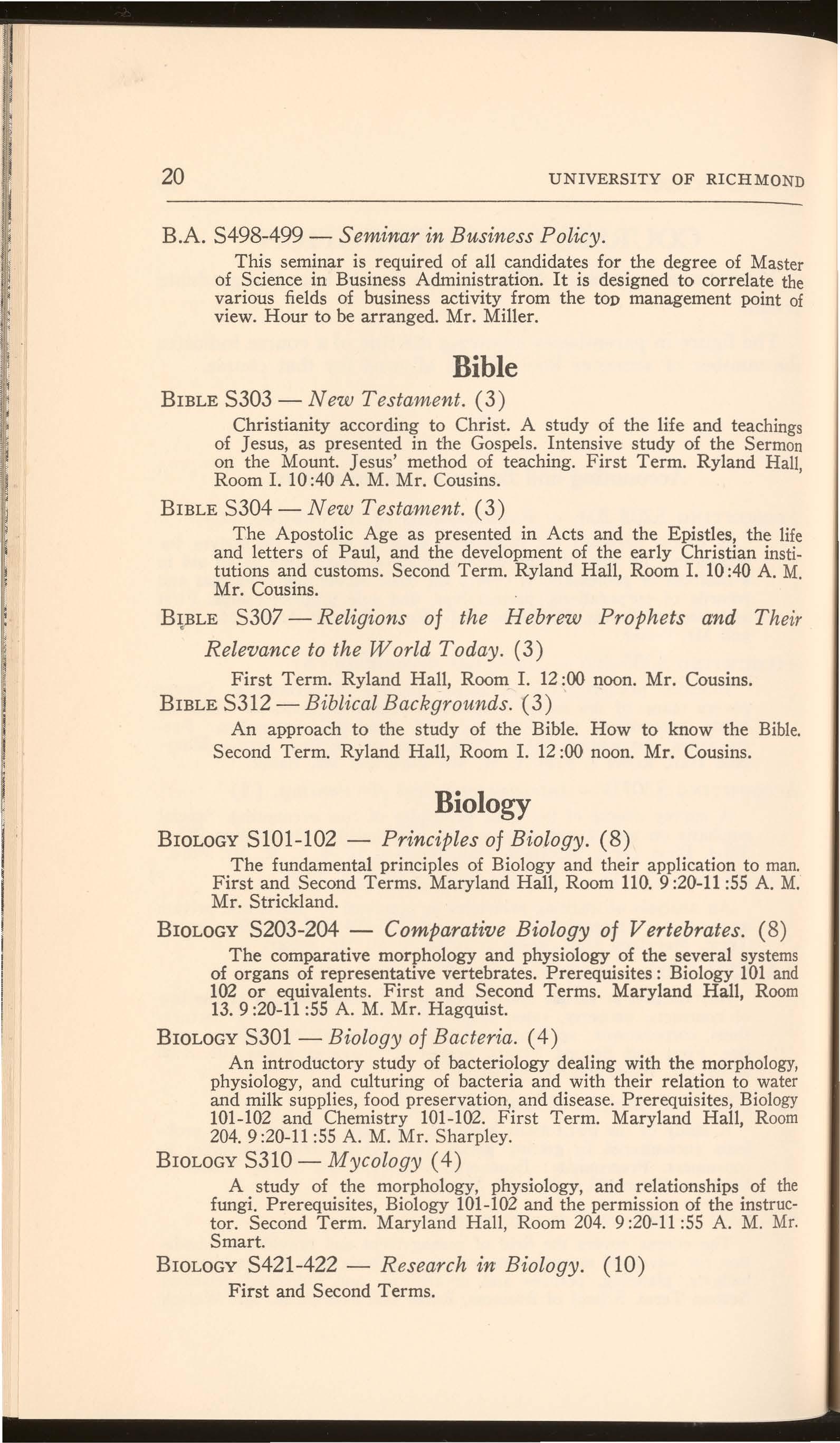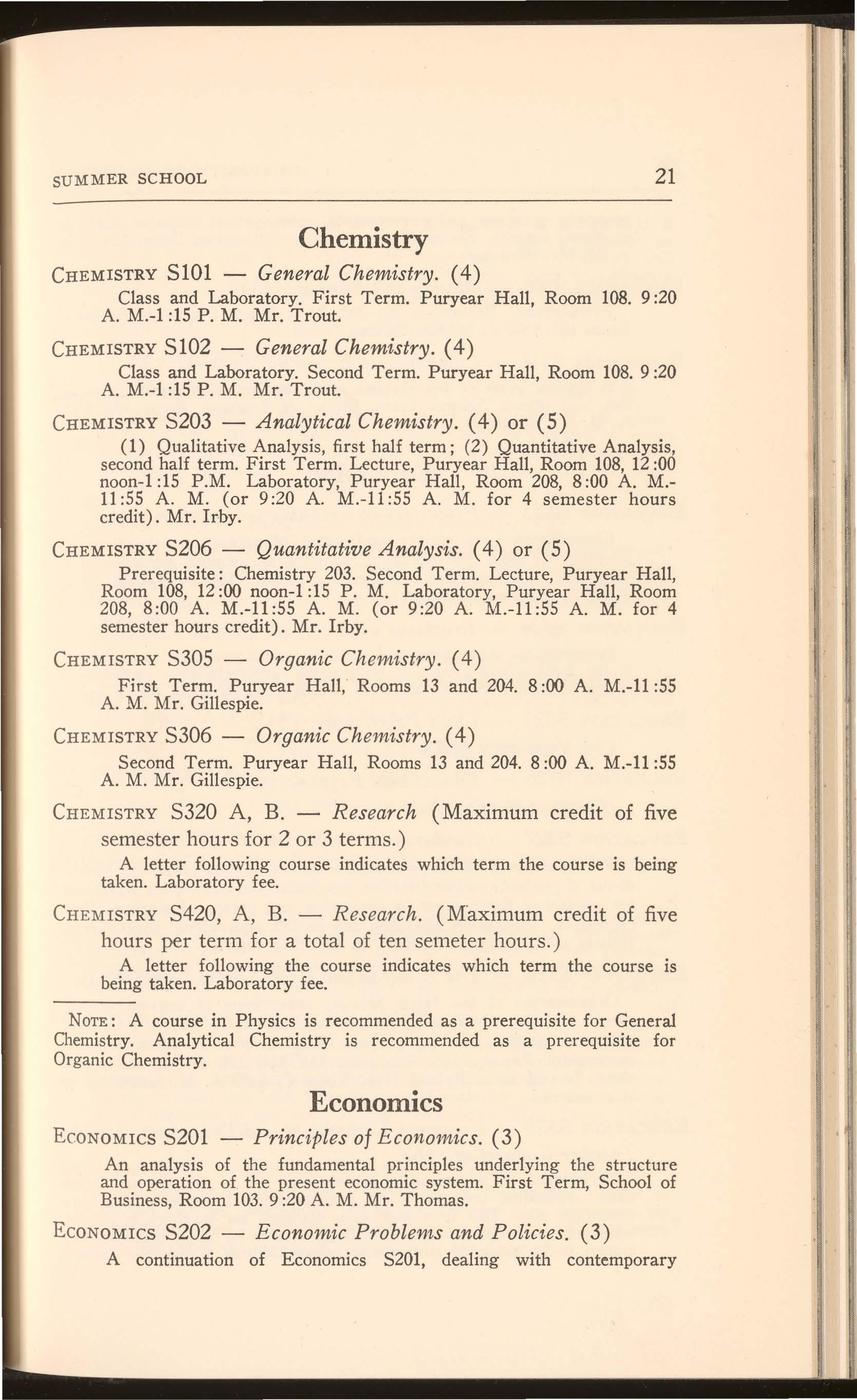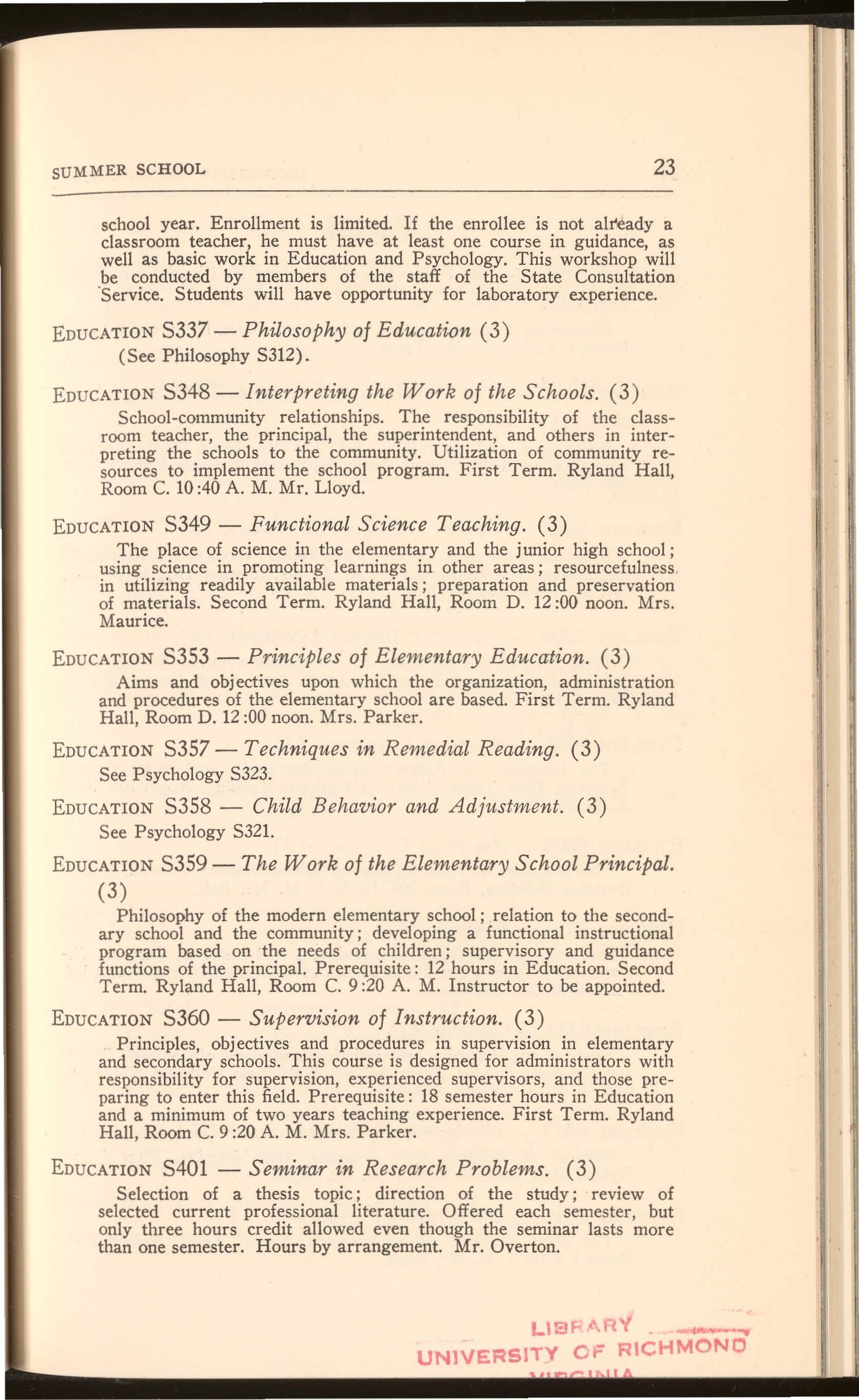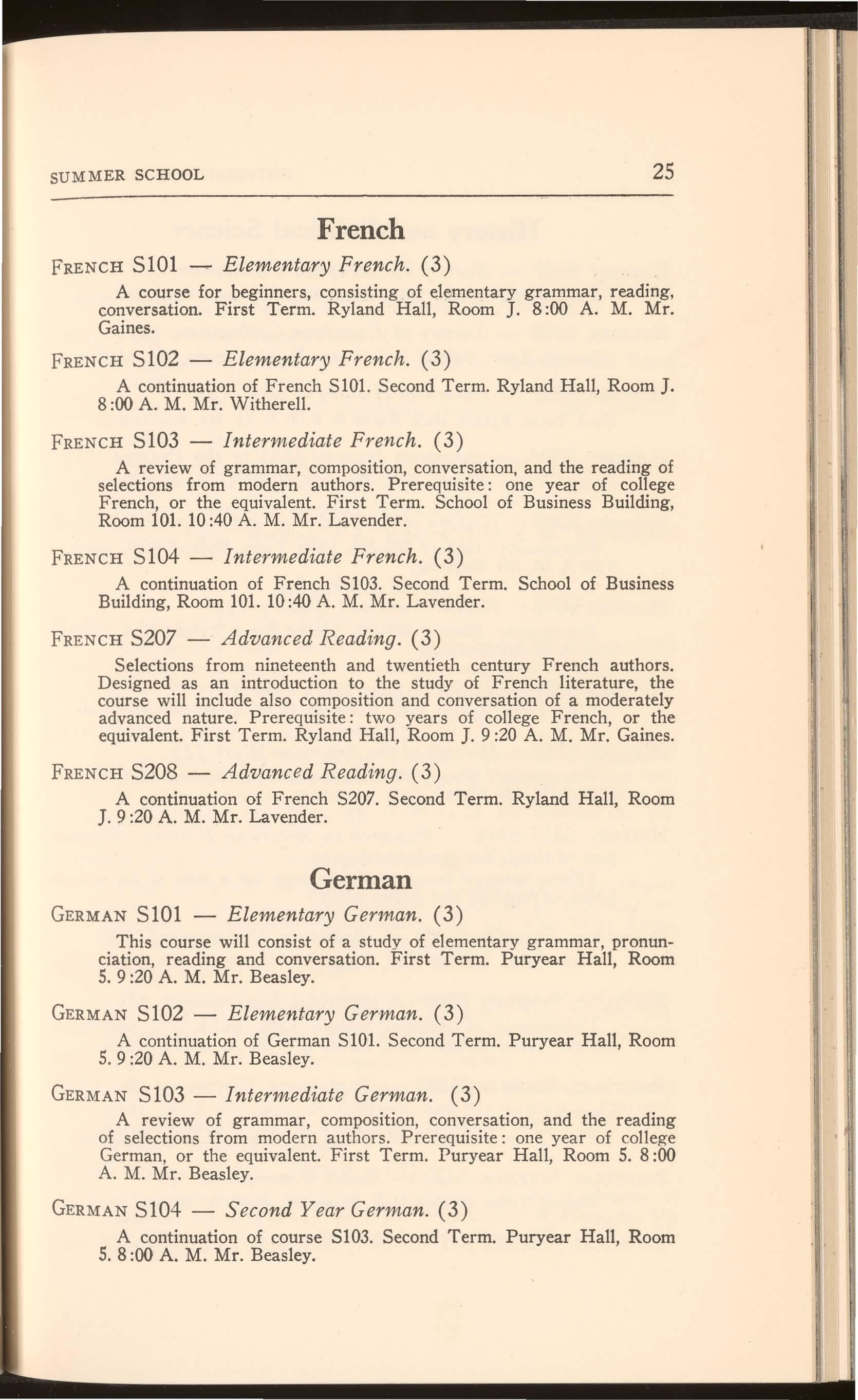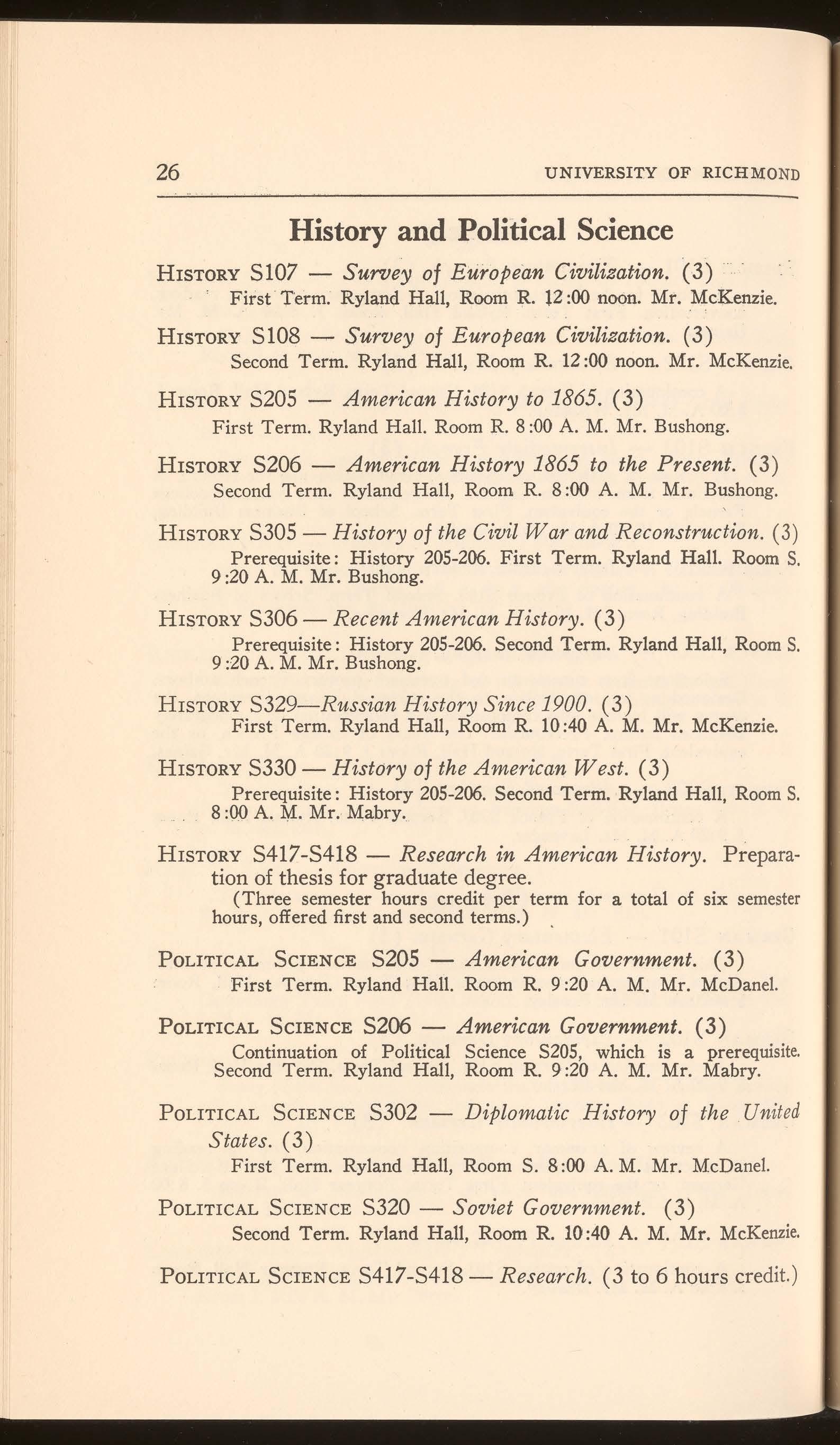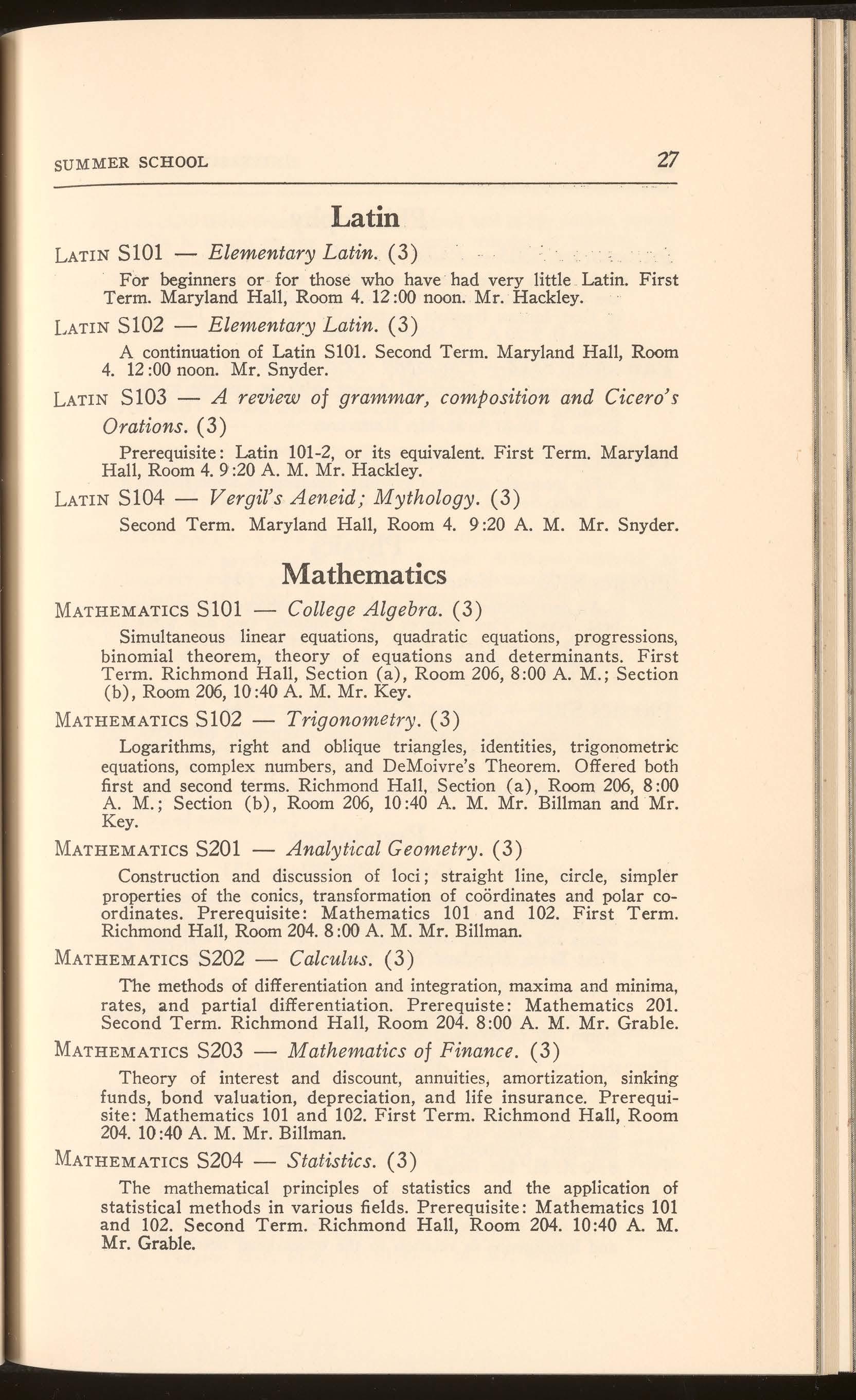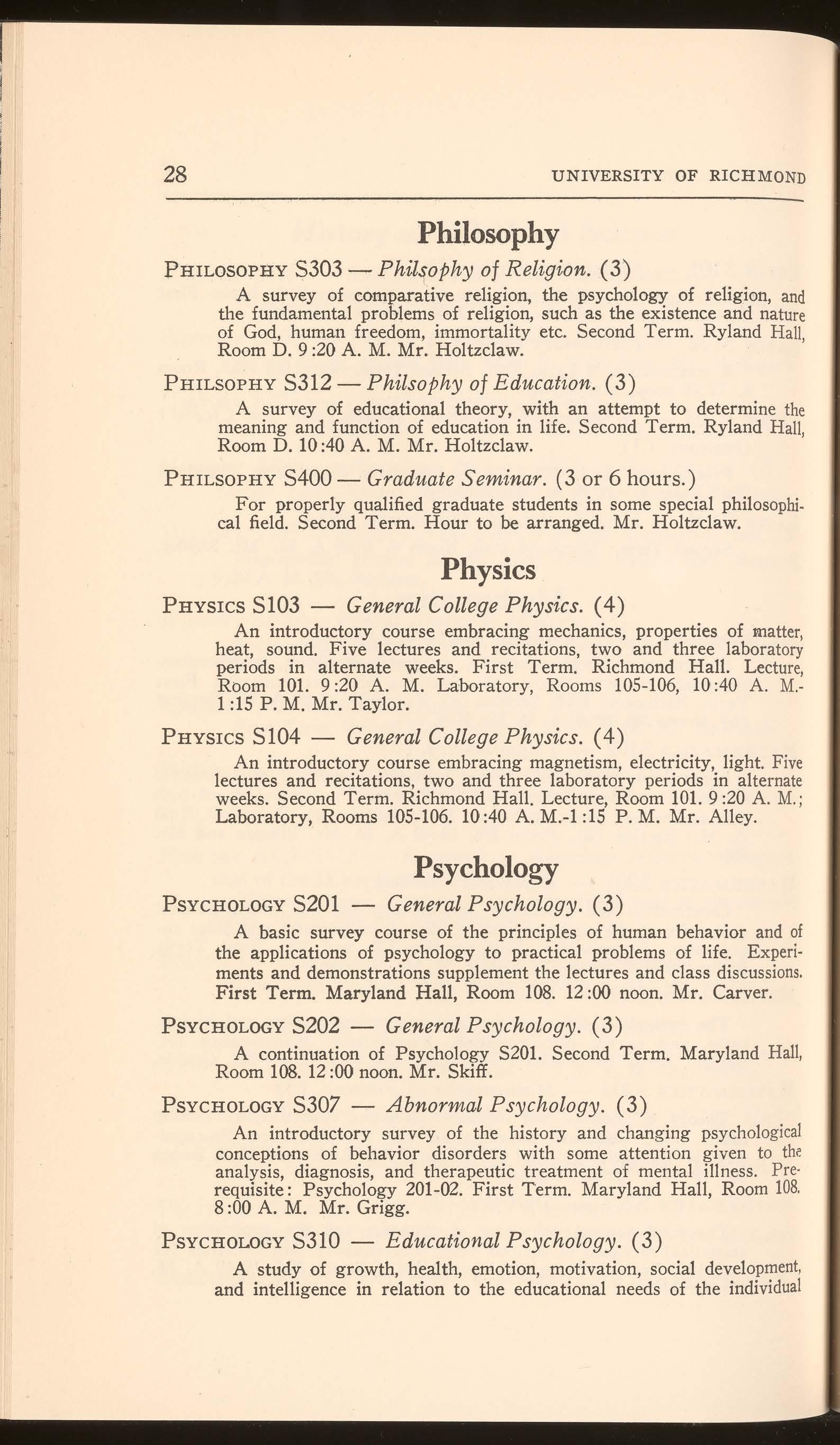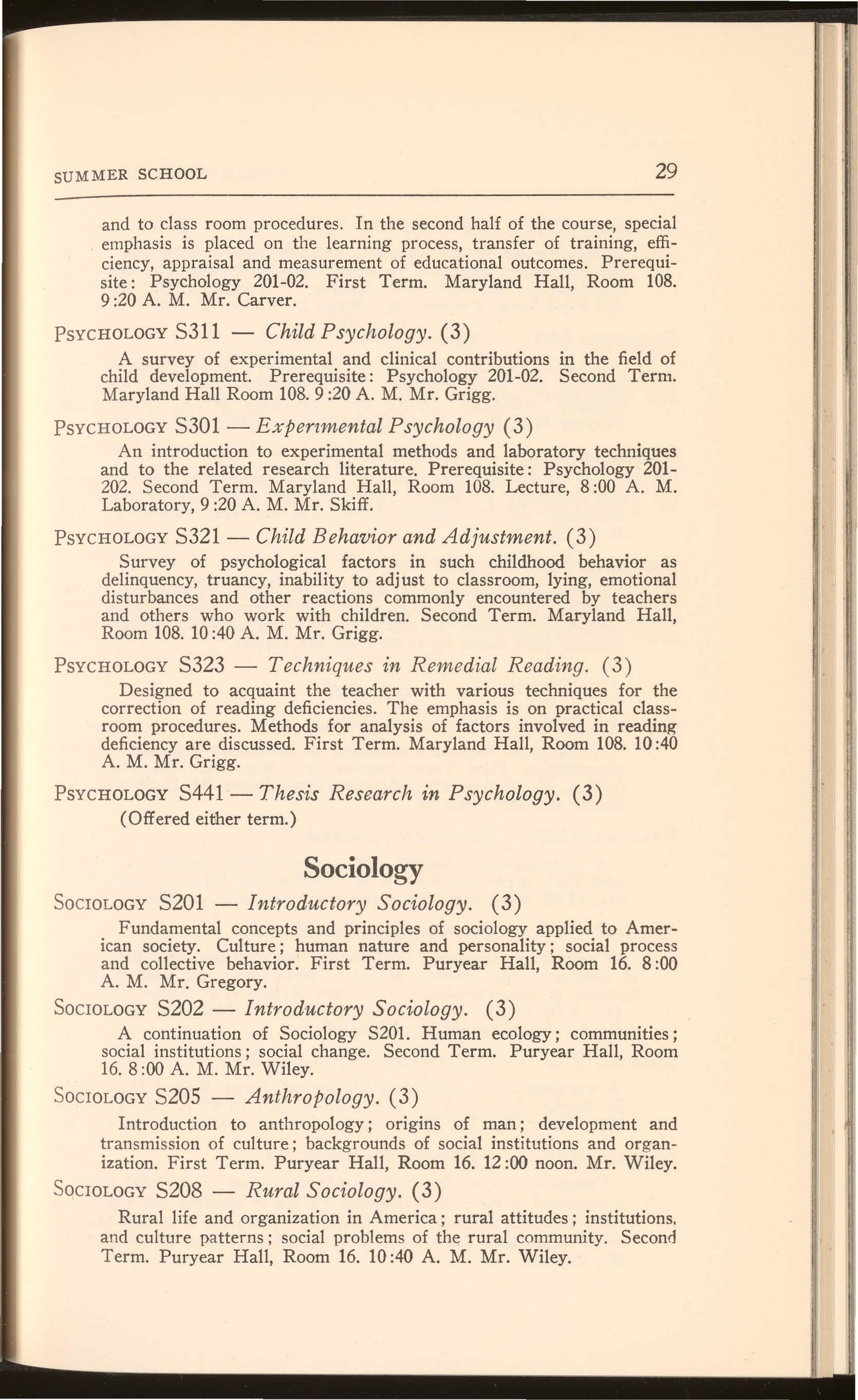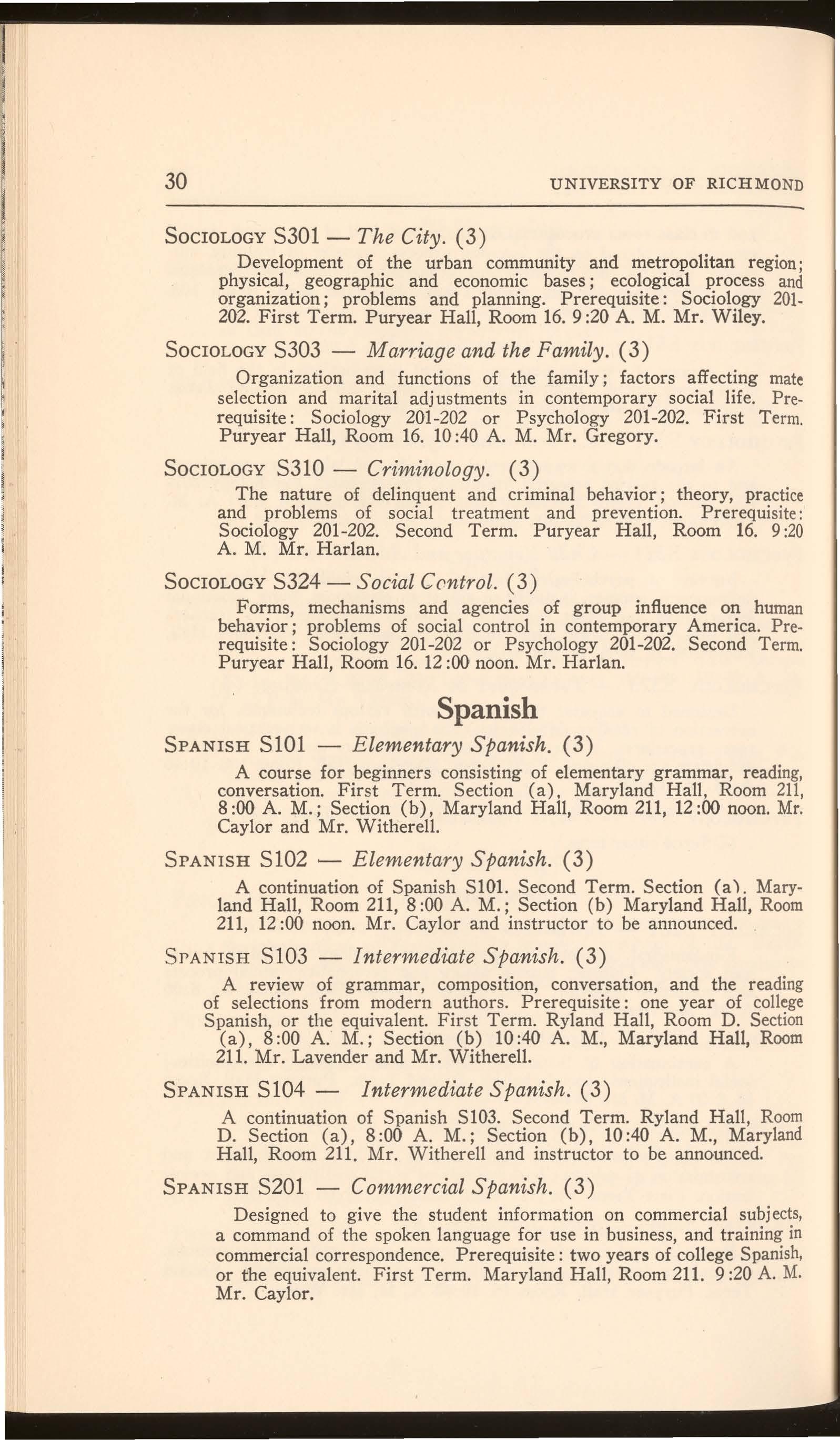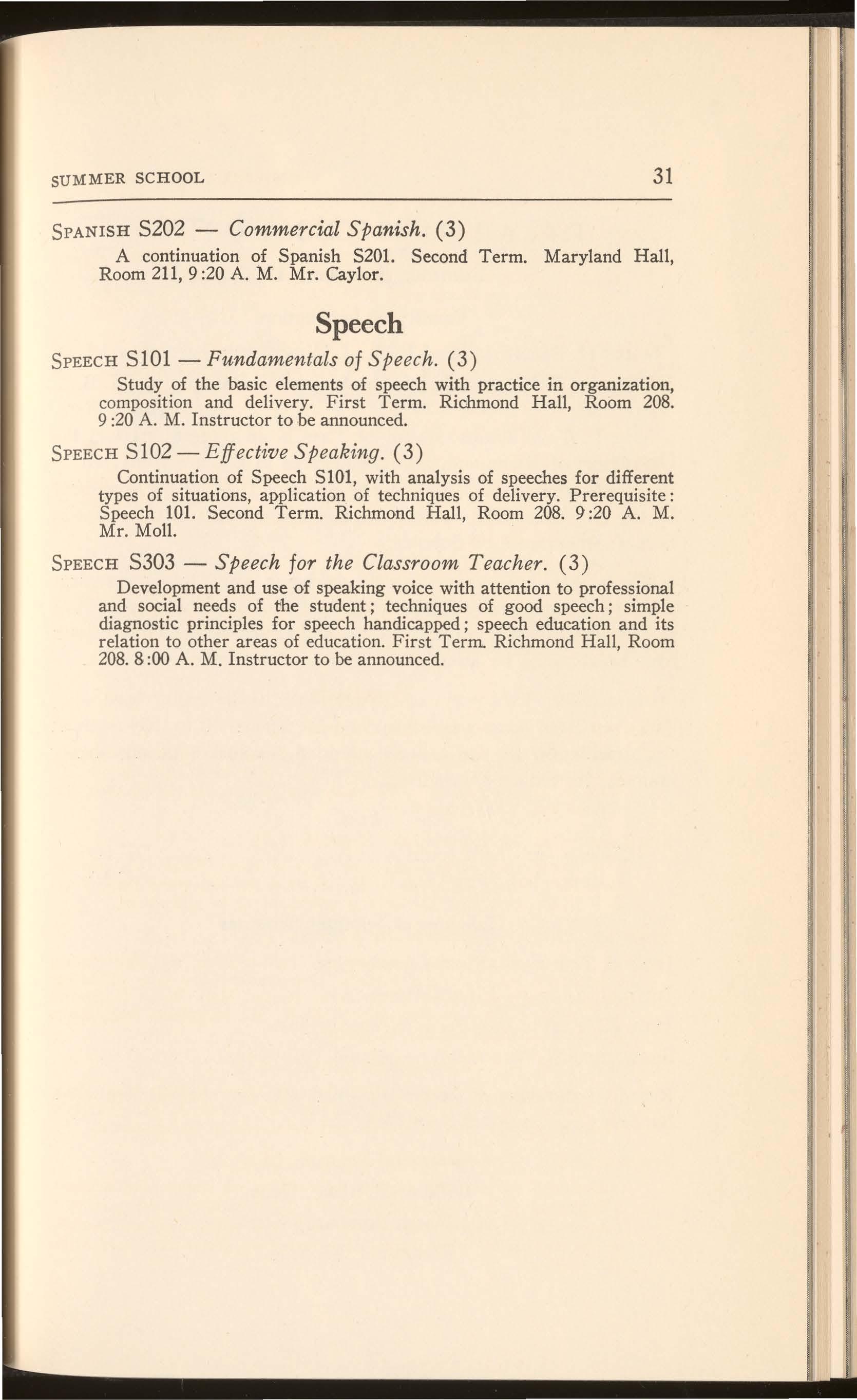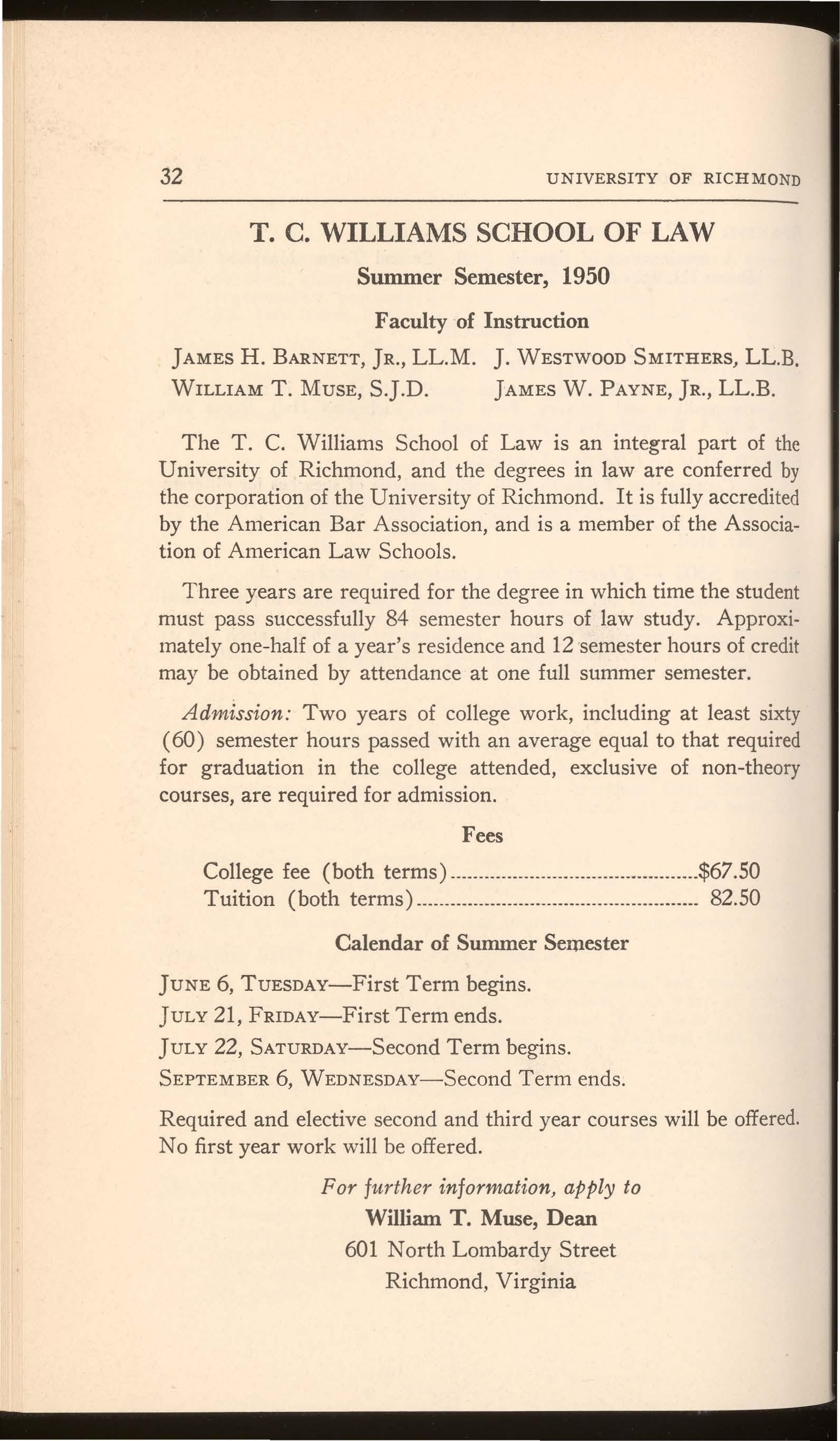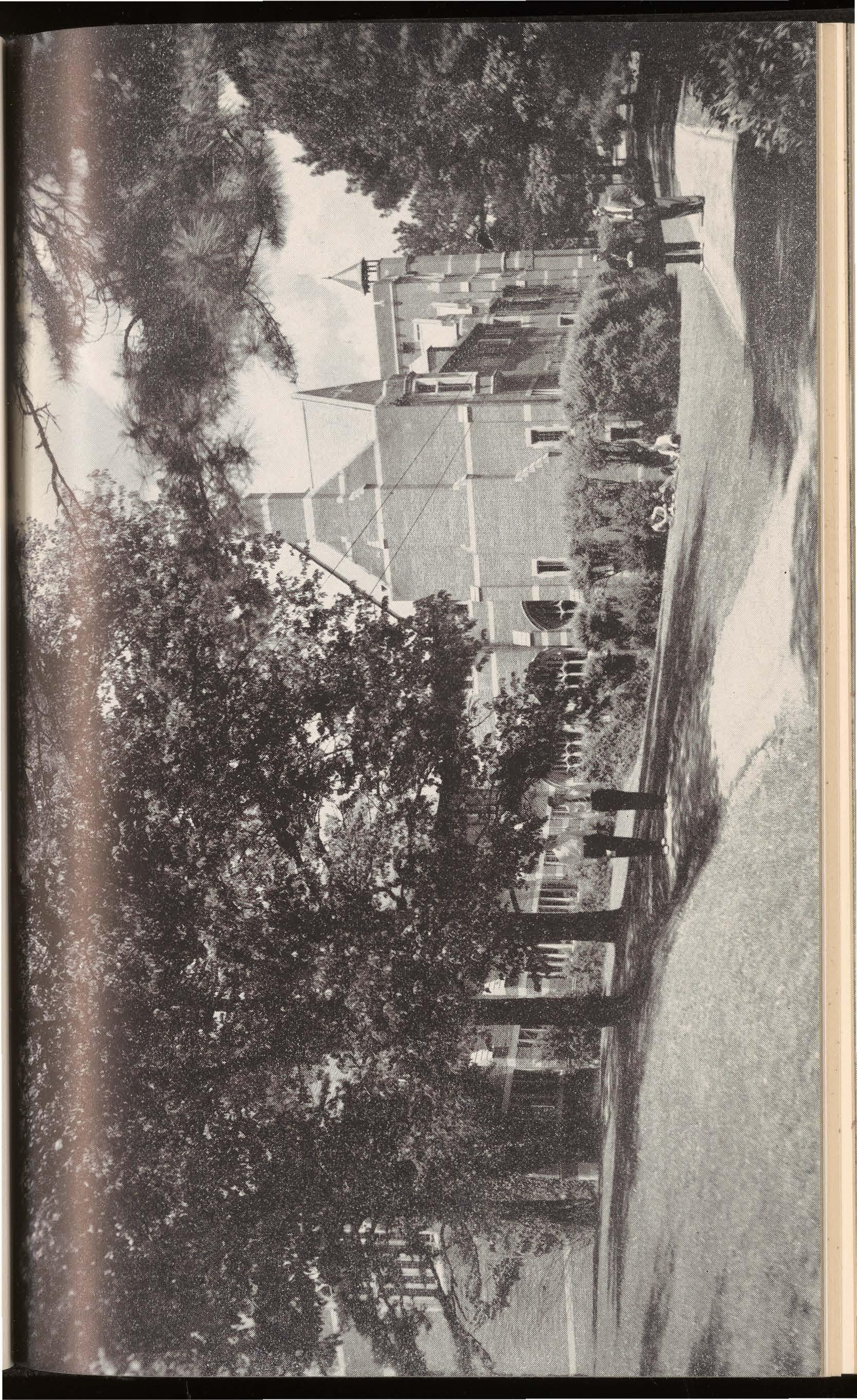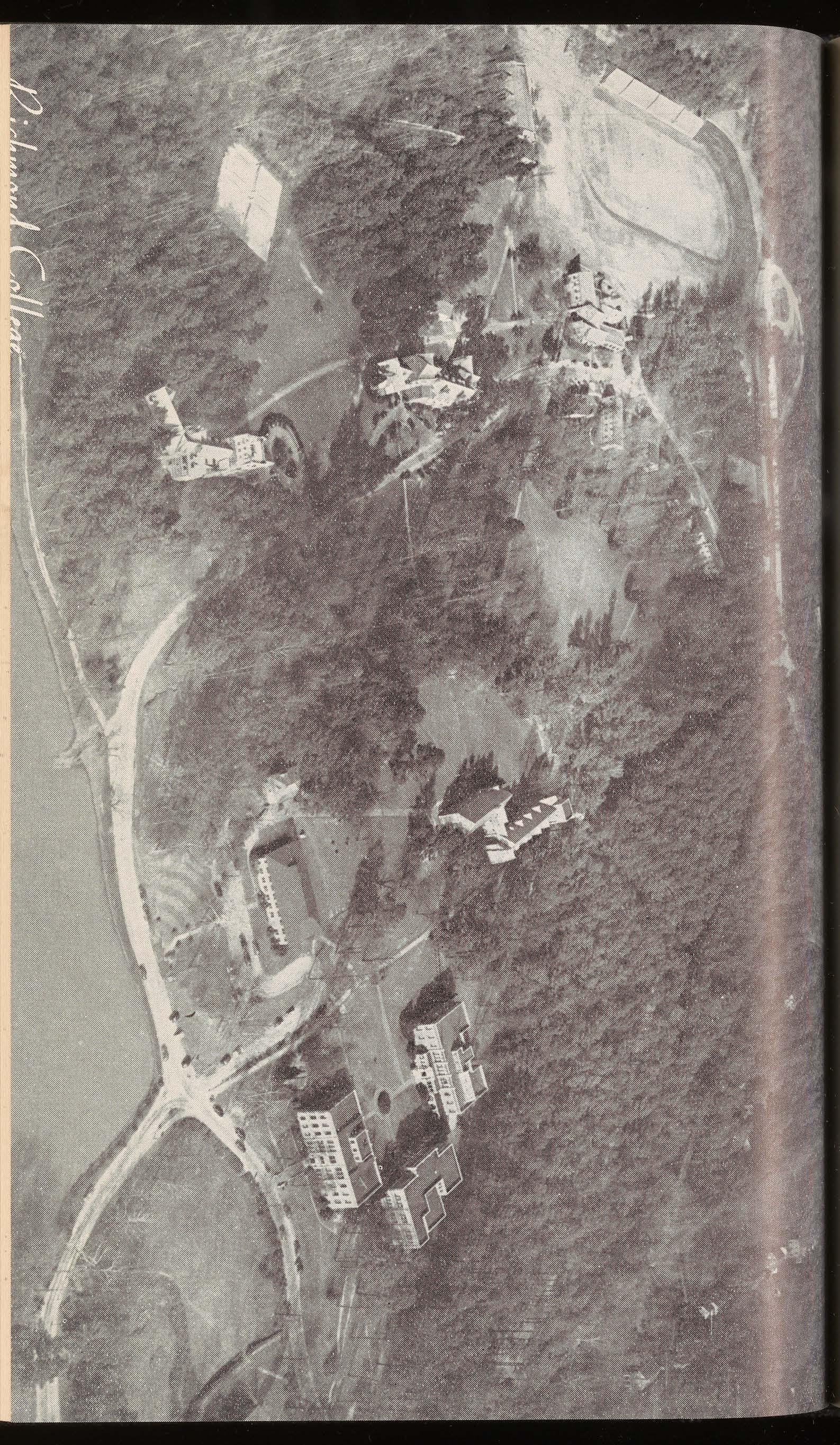CALENDAR
JUNE 12, MONDAY-Registration.
JuNE 13, TUESDAY-Class work begins.
JuNE 14, WEDNESDAY-Last day to make any changes in schedule. Applications for degrees filed in Registrar's office.
JUNE 15, THURSDAY-Opening Convocation-Henry M. Cannon Memorial Chapel, 10 :10-10 :50 A. M.
JULY 1, SATURDAY-Classes meet to make up for holiday on July 4.
JULY 4, TUESDAY-Holiday.
JuLY 20 AND 21, THURSDAYAND FRIDAY-First-term examinations.
JULY 21, FRIDAY-First term ends.
JULY 22, SATURDAY-Registration for second term.
JULY 24, MONDAY-Class work begins.
JULY 25, TUESDAY-Last day to make any changes in schedule.
AUGUST 22 AND 23, TUESDAYAND WEDNESDAY-Examinations for degree candidates.
AUGUST24 AND 25, THURSDAYAND FRIDAY-Second-term examinations.
AUGUST25, FRIDAY-Commencement.
ADMINISTRATIVE OFFICERS
FREDERIC WILLIAM BOATWRIGHT, M.A., LL.D., L.H.D. Chancellor
GEORGE M'ATTHEWS MODLIN, PH.D., LL.D. President
CHARLES H. WHEELER, III, PH.D., D.Sc. Treasurer
EDWARD FRANKLIN OVERTON, PH.D. Dean
JOSEPHINE NUNNALLY, B.A., B.S., M.A. Librarian
HELEN ALBEE MoNSELL, M.A. Registrar
FACULTY OF INSTRUCTION
•
E. ELWOOD FORD, B.A., LL.B., C.P.A. Accounting Associate Professor of Accounting
SAMUEL H. BAKER, JR., B.S. Accounting Instructor in Accounting
SoLoN B. Cousrns, B.A., D.D., LL.D. Bible Professor of Bible
ROBERT F. SMART, PH.D. Biology Professor of Biology
CARL w. HAGQUIST, PH.D. Biology Associate Professor of Biology
J. C. STRICKLAND, PH.D. Biology Assistant Professor of Biology
JOHN MILES SHARPLEY, B.A. Biology Principal Bacteriologist, Richmond Department of Public Health Laboratories.
EMANUEL M. LAST, M.S. . Business Administration
Associate Professor of Business Administration
E. ROBERT WELSCH, M.B.A. Business Administration
Assistant Professor of Business Administration
DAVID M. WHITE, JR., LL.B. . Business Administration Instructor in Business Administration
G. KENNETH MILLER, B.S. IN Bus. ADM., LL.B. Instructor in Business Administration
WILLIAM E. TROUT, JR., PH.D. Professor of Chemistry
J. s. GILLESPIE, PH.D.
Assistant Professor of Chemistry
RICHARD M. IRBY, JR., M.A
Assistant Professor of Chemistry
HERMAN P. THOMAS, PH.D. Professor of Economics
JACK N. WAGONER, A.M. Instructor in Economics
EDWARD F. OVERTON, PH.D. Professor of Education
JonN F. SHOWALTER, Pn.D.
Business Administration
Chemistr y Chemistry . Chemistry
Economics
Economics Education . Education Administrative Assistant to the Superintendent, Richmond Public Schools
WILLIAM DANIEL ELLIS, M.A. Education Principal, Albert H. Hill Junior High School, Richmond, Virginia
JULIET w ARE p ARKER, M.A. Education
Formerly Supervisor of Elementary Education, Virginia State Department of Education
WILLIAM E. LLOYD, B.S. Education Director of School-Community Relations, Richmond Public Schools
ELMIRA C. MAURICE, B.S. Education Teacher of Science, Bainbridge Junior High School, Richmond, Va.
SAMUEL w. STEVENSON, PH.D. English Professor of English
EDWARD C. PEPLE, PH.D. English Associate Professor of English
LEWIS F. BALL, PH.D. English Assistant Professor of English
WILLIAM JUDSON GAINES, PH.D. French Professor of Romance Languages
THOMAS E. LAVENDER, PH.D .• French Associate Professor of Romance Languages
SHUBAEL T. BEASLEY, JR., PH.D. German Assistant Professor of Modern Languages
RALPH C. McDANEL, PH.D. . History and Political Science Professor of History
MILLARD K. BUSHONG, PH.D. History Associate Professor of History
KERMIT E. McKENZIE, M.A. History and Political Science Graduate Student, Russian Institute, Columbia University
WILLIAM A. MABRY, PH.D. . History and Political Science Vaughn Professor of History and Government, Randolph-Macon College
WOODFORD B. HACKLEY, M.A., A. M. Latin Professor of Latin
wALTER F. SNYDER, PH.D. Latin Associate Professor of Classics
E. SHERMAN GRABLE, M.A. Mathematics Assistant Professor of Mathematics
FRANCIS B. KEY, M.A. Mathematics Assistant Professor of Mathematics
ELMER BILLMAN, M.S. Mathematics Instructor in Mathematics
BENJAMIN CLARK HOLTZCLAW, PH.D. . Philosophy Professor of Philosophy
REUBEN E. ALLEY, JR., E.E., PH.D. Physics Associate Professor of Physics
J. J. TAYLOR, M.S. Physics Instructor in Physics
MERTON E. CARVER, PH.D. . Psychology Professor of Psychology
STANLEY C. SKIFF, M.A. Psychology Assistant Professor of Psychology
AUSTIN E. GRIGG, M.A. Psychology Assistant Professor of Psychology
E. w. GREGORY, JR., PH.D. Sociology Professor of Sociology
J. HUNDLEY WILEY, PH.D. Sociology Professor of Sociology
ROLVIX HARLAN, PH.D. Sociology Professor Emeritus of Sociology
WILLIAM F. CAYLOR, M.A .• Spanish Associate Professor of Romance Languages
JAMES E. WITHERELL, M.A. Spanish Assistant Professor of Romance Languages
ALTON WILLIAMS, M.A. . Speech Associate Professor of Speech and Dramatic Arts
KARL R. MOLL, M.A. Speech Instructor in Speech
Except as otherwise indicated, all are members of the University of Richmond faculty.
GRADUATE DEGREES
Master of Arts and Master of Science in Education
It is possible for a student who has a standard B.A. or B.S. degree to take the degree of Master of Arts, or Master of Science in Education, by work in the Summer School, provided his work as an undergraduate has been of such quality as to put him in the upper half of his class. Some graduate work may be done in the summer session toward the degrees of Master of Science and Master of Science in Business Administration, but not enough work in these two fields is offered at present to allow a person to complete the requirements for the degree in the summer session only.
Certain courses in a limited number of subjects will be offered on a graduate level in the Summer School. For this summer, these courses will be in the fields of Accounting, Business Administration, Biology, Economics, Education, English, History, Philsophy, Political Science, Psychology and Sociology. It is possible, however, that special work may be arranged for graduate students with professors in other subjects as well.
Three summer sessions of residence, during which a student will be expected to complete at least 27 semester hours and write a satisfactory thesis in his major subject, will meet the minimum requirements for the degree of Master of Arts. Candidates for the degree must make a grade of at least B in all their work. Deficiencies in their work as undergraduates may be made up, but this will, of course, require a longer time and a greater number of courses.
The requirements for the degree of Master of Science in Education are the same as the requirements for the Master of Arts except that the student does his major work in the field of Education.
Those interested in taking the Master's Degree by work in thP. Summer Session should write for particulars to Professor B. C. Holtzclaw, Dean of the Graduate School, University of Richmond, Va.
Examinations and Credits
Examinations are necessary to obtain credit for any course. They will be given at the end of each term.
Special examinations on work in the Summer Session may be taken with the Richmond College special examinations on September 13th and 14th. Applications for such a special examination must be made, in writing, to the Registrar's office not later than September 6th. Each application must be accompanied by the treasurer's receipt for the two dollar special examination fee.
Due to the short terms no absences from classes are expected. Emergencies will be dealt with individually.
For any course dropped after the fourth meeting of a class m either term, a grade of "F" will be recorded.
Limits of Work
The normal amount of work which a student may take is two 3-semester hour courses ( or one 3-semester hour course and a laboratory science) each term. Students who wish to take more than this amount of work must include with their request a written statement of approval from the dean ( or other proper official) of the college or university to which credits are to be sent. Final approval rests with the Dean of the Summer School. Much time will be saved if the student has his statement in hand at the time of application for admission.
Veterans who wish to attend the Summer School under Public Law 16 or Public Law 346 should carry at least five semester hours of work to be eligible for full subsistence. In practically all cases except a five-semester hour laboratory science the veteran must carry two three-semester hour classes in order to be eligible for his regular benefits in accordance with the regulations of the Veterans Administration.
Matriculation
Students register for the first term only or for both terms on Monday, June 12, from 9 :00 A. M. to 12 :00 noon, and from 1 :00 P. M. to 4 :30 P. M. Students attending the second term
UNIVERSITY OF RICHMOND
only wilt' register on Saturday, July 22, from 9 :00 A. M. to 12:30 P. M.
Regular class work will begin at 8 :00 A. M. Tuesday, June 13. Class absences count from the first day.
After registration has been completed, no student is permitted to change from one course to another or from one section of a class to another without the approval of the Dean . No such change will be permitted for the first term after Wednesday, June 14, or for the second term after Tuesday, July 25.
No matriculations will be accepted for a first-term class after 4 :00 P. M., Tuesday, June 13. A delayed matriculation fee of $5.00 is charged any student who fails to matriculate for the first term by June 12, or for the second term by July 22.
Expenses
For auditing a course (i. e., attending without credit) a tuition fee of $15.00 will be charged for each term.
All charges are due at the time of registration. Checks should be made payable to University of Richmond . Deferred payment s must be arranged with the Treasurer.
Students are matriculated for a full term. In case of withdrawal for whatever cause, no refund of fees or any part of fees is made. In the event of withdrawal on account of student's sickness, proportionate deductions will be made in the charge for board.
A veteran should have his Certificate of Eligibility and Entitlement when he registers. If he does not have a valid certificate, he is required to make a deposit which would be equivalent to his fees and the cost of books and supplies.
Room and Board
Dormitory facilities will be provided for both men and women. Rooms will be furnished, but bed linen, pillow cases, towels, etc., must be supplied by the students.
The dormitories and dining halls are operated as a unit and assignments are made by the term. Ordinarily no adjustment is made on account of withdrawal.
No student is allowed to sublet his room, take another student in with him or move from one room to another without permission from the Dean.
The cost of room and board will be $96.00 for the first term of six weeks and $80.00 for the second term of five weeks. Application for a room in the dormitory should be addressed to the Dean of the Summer School. A deposit of $10.00 must be made by each applicant in order to hold a room. This fee will be refunded only if written notice releasing the room is received by the Dean before May 10, 1950. If the student occupies the room the fee is refundable after the close of the session, less any charges for damage to the building or the furniture.
Post Office and Telegraph Address
The post office address is University of Richmond, Virginia. The telegraph address is Richmond, Virginia.
Minimum Class Size
The right is reserved not to organize any class unless there are as many as ten applicants. The right is also reserved to modify or withdraw any class, or to change instructors.
The Honor Code
One of the outstanding traditions of the University of Richmond is the concept of honor held by the students in its several colleges. Breaches of the Honor Code include cheating, violation of signed pledges, stealing, lying, failure to report violations of the Honor Code, and, in general, breaking one's word of honor under any circumstances.
When a student matriculates for either term of the Summer School, he is given a detailed explanation of the Honor Code, by which he must agree to abide, before he can finally complete his matriculation.
SCHEDULE OF CLASSES
Course-First Term
Accounting S203
Bus. Admin. S301
Bus. Admin. S321
Chemistry S203L
Chemistry S30SC
Economics S301
Education S327
Education S336
English S203 (a)
English S315
French SlOl
German Sl03
History S205
Mathematics SlOl (a)
Mathematics S201
Political Science S302
Psychology S307
Sociology S201
Spanish SlOl (a)
Spanish S103(a)
Speech S303
Course-First Term
Accounting S305
Biology SlOl
Biology S203
Biology S301
Chemistry SlOlC
Chemistry S203L
Chemistry S305L
Economics S201
Education S326
Education S360
English S 101
English S313
French S207
German SlOl
History S305
Latin Sl03
Physics Sl03C
Political Science S205
Psychology S310
Sociology S301
Spanish S201
Speech Sl0l
8:00-9:15
Room
MH 2
SB 101
SB 102
PH 208
PH 13
SB 103
RyH C
John Marshall H. S.
SB 104
RyH I
RyH J
PH 5
RyH R
RyH S
RH 206
RH 204
RyH S
MH 108
PH 16
MH 211
RyH D
RH 208
9:20-10:35
Room
MH 2
MH 110
MH 13
MH 204
PH 108
PH 208
PH 13-204
SB 103
MH 108
RyH C
RyH I
SB 104
RyH J
PH 5
RyH S
MH 4
RyH D
RH 103
RyH R
MH 5
MH 108
PH 16
MH 211
RH 208
Course-Second Term
Accounting S204
Bus Admin. S302
Bus. Admin. S341
Chemistry S206L
Chemistry S306C
Economics S316
Education S328
English S204
English S316
French S102
German S104
History S206
History S330
Mathematics S102(a)
Mathematics S202
Psychology S301C
Sociology S202
Spanish S102 (a)
Spanish S104(a)
Course-Second Term
Accounting S306
Biology S102
Biology S204
Biology S310
Chemistry Sl02C
Chemistry S206L
Chemistry S306L
Economics S202
Education S325
Education S359
English S102
English S314
French S208
German S102
History S306
Latin S104
Philosophy S303
Physics Sl04C
Political Science S206
Psychology S301L
Psychology S311
Sociology S310
Spanish S202
Speech S102
SCHEDULE OF CLASSES
Course-First Term
Accounting S307D
Bible S303
Biology SlOl
Biology S203
Biology S301
Chemistry Sl0lL
Chemistry S203L
Chemistry S305L
Education S348
Education S357
English S305
French S103
History S329
Mathematics S 101(b)
Mathematics S203
Physics S 103L
Psychology S323
Sociology S303
Spanish S103 (b)
Course-First Term
Bible S307
Chemistry Sl0lL
Chemistry S203C
Education S323
Education S353
English S203(b)
History S 107
Latin S101
Physics S103L
Psychology S201
Sociology S205
Spanish S 101(b)
10:40-11:SS
Room
MH 2
RyH I
MH 110
MH 13
MH 204
PH 108-103
PH 208
PH 204
RyH D
MH 108
SB 104
SB 101
RyH R
RH 206
RH 204
RyH D
Rii 105-106
RyH R
MH 108
PH 1-6
MH 211
12:00-1:15
Room
RyH I
PH 103
PH 108
RyH C
RyH D
SB 104
RyH R
MH 4
RH 105-106
MH108
PH 16
MH 211
Course--Second Term
Accounting S311D
Bible S304
Biology S102
Biology S204
Biology S310
Chemistry S 102L
Chemistry S206L
Chemistry S306L
Education S337
Education S358
English S306
French S104
Mathematics S102(b)
Mathematics S204
Philosophy S312
Physics S104L
Political Science S320
Psychology S321
Sociology S208
Spanish S104(b)
Course--Second Term
Bible S312
Chemistry SlOZL
Chemistry S206C
Education S324
Education S349
History Sl08
Latin S102
Physics S104L
Psychology S202
Sociology S324
Spanish Sl02(b)
In the laboratory sciences, C and L after the number indicate class and laboratory respectively. The small letters, (a), (b), etc., indicate sections of the same class.
Rooms C through S are in Ryland Hall. SB indicates School of Business, MH Maryland Hall, PH Puryear Hall, RH Richmond Hall, and Ry H Ryland Hall. Meeting places of the respective classes are the same for both first and second terms, unless otherwise indicated.
UNIVERSITY OF RICHMOND
State Scholarships
As .a means of increasing the supply of better qualified teachers in the public schools of the State, the Virginia General Assembly has established a limited number of summer school scholarships, not to exceed one hundred dollars each, for college graduates, who wish to qualify for the Collegiate Professional Certificate.
Virginia teachers who are interested in applying for these scholarships should see their division superintendent or write directly to the Dean of the Summer School for detailed information. May 1st is the deadline for filing applications with the State Department of Education.
SUMMARY OF ENROLLMENT 1949
Approximately 530 of the total were veterans of World War II.
DEGREES
CORRECTIONS
1. ACCOUNTIHGS203-204 will be offered at the third period (10:40-11:55 a.m.) insteadc:,:t'at the first period as stated on pages 16 and 19.
2. ACCOUNTING S307D and S311D will be offered at the first period (8:009:15 a.m.) instead of at the third period as stated on pages 16 and 19.
3. ZCONO~.lICS S301 and S316 will be offered at the third period (10:4011:55 a.m.) instead of at the first period as stated on pages 16 and 19.
4. Instead of Bus. Ad.I!l. S498-499 (page 20) the following seminars will be offered:
B.A.S421 - Seminar in Marketing. (3)
This is a graduate course designed to acquaint the student with current literature in marketing. Hours to be arranged with instructor.
B.A. S441 - Seminar in 1.ianagement. (3)
A graduate course in which the student conducts research in a particular management area. Hours to be arranged with instructor.
UNIVERSITY OF RICHMOND
State Scholarships
As a means of increasing the supply of better qualified teachers in the public schools of the State, the Virginia General Assembly has established a limited number of summer school scholarships, not to exceed one hundred dollars each, for college graduates, who wish to qualify for the Collegiate Professional Certificate.
Virginia teachers who are interested in applying for these scholarships should see their division superintendent or write directly to the Dean of the Summer School for detailed information. May 1st is the deadline for filing applications with the State Department of Education.
•
SUMMARY OF ENROLLMENT 1949
Approximately
COURSES OF INSTRUCTION
Most courses numbered 300 and above may be taken for graduate credit.
The figure in parentheses following the title of a course indicates the number of semester hours credit allowed for that course .
•
Accounting and Business Administration
AccouNTINGS203-204 - Fundamentals of Accouuting. (6)
A course designed for those who wish to prepare themselves for accounting, or who seek an understanding of accounting as an aid in a business or profession. It covers the basic accounting principles and records of corporations, partnerships, and sole proprietorships. First and Second Terms. Maryland Hall, Room 2. 8 :00 A. M. Mr. Ford and Mr. Baker.
AccouNTINGS305-306-Advanced Accounting (6)
Intended primarily for advanced students of accounting. Course covers many of the major subjects of higher accountancy including estate accounting, consolidations, and municipal accounting. Prerequisites, Accounting 203-4, 303-4. First and Second Terms. Maryland Hall, Room 2. 9 :20 A. M. Mr. Ford and Mr. Baker.
AccouNTINGS307D - Introductory Cost Accounting. (3)
A survey course of the basic principles of cost accounting. Special emphasis on use of cost information. Prerequisites, Accounting 203-4, 303-4. First Term. Maryland Hall, Room 2. 10 :40 A. M. Mr. Ford.
AccouNTINGS311D - Introductory Auditing. (3)
An analysis of auditing principles as practiced by public and private accountants. Prerequisites : Accounting 203-204 and 303-304. Second Term. Maryland Hall, Room 2. 10 :40 A. M. Mr. Baker.
B.A. S301-S302 - Business Law. (6)
Introduction to nature and source of law; fundamentals of the law of contracts, property, sales, negotiable instruments, agency partnerships, corporations; application of law fundamentals to business practice. First and Second Terms. School of Business, Room 101. 8 :00 A. M. Mr. White and Mr. Miller.
B.A.S321- Principles of Marketing. (3)
A study of the institutions involved, functions performed, and problems encountered in getting goods and services from producers to consumers. Prerequisite: Economics 201-202. First Term. School of Business, Room 102. 8 :00 A. M. Mr. Last.
B.A.S341 - Industrial Management. ( 3)
The course covers the field of management and provides a foundation for advanced management training. It deals with the problems of budgets, planning, policies and procedures, and industrial relations. Second Term. School of Business, Room 102. 8 :00 A. M. Mr. Welsch.
UNIVERSITY OF RICHMOND
B.A. S498-499- Seminar in Business Policy.
This seminar is required of all candidates for the degree of Master of Science in Business Administration. It is designed to correlate the various fields of business activity from the too management point of view. Hour to be arranged. Mr. Miller.
Bible
BIBLE S303 - New Testament. (3)
Christianity according to Christ. A study of the life and teachings of Jesus, as presented in the Gospels. Intensive study of the Sermon on the Mount. Jesus' method of teaching. First Term. Ryland Hall, Room I. 10 :40 A. M. Mr. Cousins.
BIBLE S304- New Testament. (3)
The Apostolic Age as presented in Acts and the Epistles, the life and letters of Paul, and the development of the early Christian institutions and customs. Second Term. Ryland Hall, Room I. 10 :40 A. M. Mr. Cousins.
B:p3LE S307 - Religions of the Hebrew Prophets and Their Relevance to the World Today. (3)
First Term Ryland Hall, Room I. 12 :00 noon. Mr. Cousins.
BIBLE S312 - Biblical Backgrounds. ( 3)
An approach to the study of the Bible. How to know the Bible. Second Term. Ryland Hall, Room I. 12 :00 noon. Mr. Cousins.
Biology
BIOLOGY S101-102 - Principles of Biology. (8)
The fundamental principles of Biology and their application to man. First and Second Terms. Maryland Hall, Room 110. 9 :20-11 :55 A. M. Mr. Strickland.
BIOLOGY S203-204 - Comparative Biology of Vertebrates. (8)
The comparative morphology and physiology of the several systems of organs of representative vertebrates. Prerequisites: Biology 101 and 102 or equivalents. First and Second Terms. Maryland Hall, Room 13. 9 :20-11 :55 A. M. Mr. Hagquist.
BIOLOGY S301 - Biology of Bacteria. ( 4)
An introductory study of bacteriology dealing with the morphology, physiology, and culturing of bacteria and with their relation to water and milk supplies, food preservation, and disease. Prerequisites, Biology 101-102 and Chemistry 101-102. First Term. Maryland Hall, Room 204. 9 :20-11 :55 A. M. Mr. Sharpley.
BIOLOGY S310-Mycology (4)
A study of the morphology, physiology, and relationships of the fungi. Prerequisites, Biology 101-102 and the permission of the instructor. Second Term. Maryland Hall, Room 204. 9 :20-11 :55 A. M. Mr. Smart.
BIOLOGY S421-422 - Research in Biology. (10)
First and Second Terms.
SUMMERSCHOOL
CHEMISTRYS101 - General Chemistry. ( 4) 21
Chemistry
Class and Laboratory. First Term. Puryear Hall, Room 108. 9 :20 A. M.-1 :15 P. M. Mr. Trout.
CHEMISTRYS102 - General Chemistry. (4)
Class and Laboratory. Second Term. Puryear Hall, Room 108. 9 :20 A. M.-1 :15 P. M. Mr. Trout.
CHEMISTRYS203 - Analytical Chemistry. (4) or (S)
(1) Qualitative Analysis, first half term; (2) Quantitative Analysis, second half term. First Term. Lecture, Puryear Hall, Room 108, 12 :00 noon-! :15 P.M. Laboratory, Puryear Hall, Room 208, 8 :00 A. M.11 :55 A. M. (or 9:20 A. M.-11:55 A. M. for 4 semester hours credit). Mr. Irby.
CHEMISTRYS206 - Quantitative Analysis. (4) or (5)
Prerequisite: Chemistry 203. Second Term. Lecture, Puryear Hall, Room 108, 12 :00 noon-! :15 P. M. Laboratory, Puryear Hall, Room 208, 8:00 A. M.-11:55 A. M. (or 9:20 A. M.-11:55 A. M. for 4 semester hours credit). Mr. Irby
CHEMISTRYS305 - Organic Chemistry. ( 4)
First Term. Puryear Hall, Rooms 13 and 204. 8 :00 A . M.-11 :55 A. M. Mr. Gillespie.
CHEMISTRYS306 - Organic Chemistry. ( 4)
Second Term. Puryear Hall, Rooms 13 and 204. 8 :00 A. M.-11 :55 A. M. Mr. Gillespie.
CHEMISTRYS320 A, B. - Research (Maximum credit of five semester hours for 2 or 3 terms.)
A letter following course indicates which term the course is being taken. Laboratory fee.
CHEMISTRYS420, A , B. - Research. (Maximum credit of five hours per term for a total of ten semeter hours.)
A letter following the course indicates which term the course is being taken. Laboratory fee.
NoTE: A course in Physics is recommended as a prerequisite for General Chemistry. Analytical Chemistry is recommended as a prerequisite for Organic Chemistry.
Economics
EcoNoM1cs S201 - Principles of Economics. (3)
An analysis of the fundamental principles underlying the structure and operation of the present economic system. First Term, School of Business, Room 103. 9 :20 A. M Mr. Thomas.
EcoNOMICSS202 - Economic Problems and Policies. (3)
A continuation of Economics S201, dealing with contemporary
UNIVERSITY OF RICHMOND
economic problems and governmental participation in major fields of economic activity. Second Term. School of Business, Room 103. 9 :20 A. M. Mr. Wagoner.
EcoNOMICS S301 - Money and Banking. (3)
Prerequisite: Economics 201-202. First Term. School of Business, Room 103. 8 :00 A. M. Mr. Thomas.
EcoNOMICS S316 - Comparative Economic Systems. (3)
A critical study of the systems of Capitalism, Communism, Socialism, and others. Second Term. School of Business, Room 103. 8 :00 A. M. Mr. Wagoner.
Education
EDUCATION S323 - Principles of Secondary Education. (3)
Characteristics, objectives and scope of secondary education, its attempts to meet the needs of adolescents through administrative , curricular, and extra-class activities. First Term. Ryland Hall , Room C. 12 :00 noon. Mr . Ellis.
EDUCATION S324 - Problems of the High School Teacher. (3)
Instructional procedures; evaluation of pupil progress; participation in the total school program ; community responsibilities; professional ethics. Second Term. Ryland Hall, Room C. 12 :00 noon. Mr. Ellis.
EDUCATION S325 - Child Psychology. (3)
(See Psychology S311).
EDUCATION S326 - Educational Psychology. (3)
(See Psychology S310)
EDUCATION S327 - Guidance in the Secondary School. (3)
The need for guidance ; concepts of guidance ; its purposes ; instruments of guidance; administrative, curricular and extra-class provisions for guidance; the teacher as counsellor and personnel worker. Prerequisites: Education 323, 324, 325 or the equivalent. First Term Ryland Hall, Room C. 8 :00 A. M. Mr. Showalter.
EDUCATION S328 - The Work of the High School Principal. (3 )
Organization of the High School ; supervision of instruction ; inservice training of teachers; the non-teaching staff; student activities ; guidance functions of the principal; relationship of the school and the community. Prerequisite: Education 323, 324, 325, 326, or the equivalent. Second term. Ryland Hall, Room C. 8 :00 A. M. Instructor to be announced.
EDUCATION S336 - Guidance Techniques and Procedures for the Teacher-Counsellor. ( 6)
Techniques of interviewing, survey and use of records and other data, counselling procedures and case analysis. First term only, five hours per day. This is a workshop designed for teachers in service who have counselling responsibilities, and also for those teachers who expect to be assigned counselling responsibilities during the coming
SCHOOL 23
school year. Enrollment is limited. If the enrollee is not already a classroom teacher, he must have at least one course in guidance, as well as basic work in Education and Psychology. This workshop will be conducted by members of the staff of the State Consultation service. Students will have opportunity for laboratory experience.
EDUCATION S337-Philosophy of Education (3) ( See Philosophy S312).
ED U CATION S348 - Interpreting the Wark of the Schools ( 3)
School-community relationships. The responsibility of the classroom teacher, the principal, the superintendent, and others in interpreting the schools to the community Utilization of community resources to implement the school program. First Term. Ryland Hall, Room C. 10 :40 A. M Mr. Lloyd.
EDUCATION S349 - Functional Science Teaching. (3)
The place of science in the elementary and the junior high school; using science in promoting learnings in other areas; resourcefulness . in utilizing readily available materials ; preparation and preservation of materials. Second Term. Ryland Hall, Room D. 12 :00 noon. Mrs. Maurice
E DUCATION S353 - Principles of Elementary Education. ( 3)
Aims and objectives upon which the organization, administration and procedures of the elementary school are based. First Term. Ryland Hall, Room D. 12 :00 noon Mrs Parker.
EDUCATION S357 - Techniques in Remedial Reading. (3)
See Psychology S323.
E DUCATION S358 - Child Behavior and Adjustment. (3)
See Psychology S321.
ED U CATION S359- The Work of the Elementary School Principal. (3)
Philosophy of the modern elementary school; relation to the secondary school and the community; developing a functional instructional program based on the needs of children ; supervisory and guidance functions of the principal. Prerequisite: 12 hours in Education. Second Term . Ryland Hall, Room C. 9 :20 A. M. Instructor to be appointed.
ED U CATION S360 - Supervision of Instruction. (3)
Principles, objectives and procedures in supervision in elementary and secondary schools. This course is designed for administrators with responsibility for supervision, experienced supervisors, and those preparing to enter this field. Prerequisite: 18 semester hours in Education and a minimum of two years teaching experience First Term. Ryland Hall, Room C. 9 :20 A. M. Mrs Parker.
E DUCATION S401 - Seminar in Research Problems. (3)
Selection of a thesis topic; direction of the study; review of selected current professional literature. Offered each semester, but only three hours credit allowed even though the seminar lasts more than one semester. Hours by arrangement. Mr. Overton.
UNIVERSITY OF RICHMOND
English
ENGLISH S101 - The Principles of Writing in Theory and Practice. (3)
Exposition. Frequent written assignments. First Term. Ryland Hall, Room I. 9 :20 A. M. Mr. Peple.
ENGLISH S102 - The Principles of Writing in Theory and Practice. (3)
Description and narration, including the short story. Frequent written assignments. Second Term. Ryland Hall, Room I. 9 :20 A M. Mr. Ball.
ENGLISH S203 - Survey of English Literature. (3)
From the beginnings to 1700. First Term. School of Business Building, Room 104. Section (a), 8:00 A. M.; Section (b), 12:00 noon. Mr. Stevenson and Mr. Ball.
ENGLISH S204 - Survey of English Literature. (3)
From 1700 to the beginning of the present century. Second Term. School of Business Building, Room 104. 8 :00 A. M. Instructor to be announced.
ENGLISH S305 -American Literature. (3)
The literature of America from the early settlements through Emerson. First Term. School of Business Building, Room 104. 10 :40 A. M. Mr. Ball.
ENGLISH S306 - American Literature. ( 3)
The literature of America since Emerson. Second Term. School of Business Buil~ing, Room 1Q_410 :40 A. M. Mr. Ball.
ENGLISH S313 - Chaucer. (3)
Study of the languages, pronunciation, and meter of Chaucer. The Canterbury Tales. First Term. School of Business Building, Room 104. 9 :20 A. M. Mr. Stevenson.
ENGLISH S314 - Chaucer. (3)
Study of the language, pronunciation, and meter of Chaucer. Troilus and Criseyde. Second Term. School of Business Building, Room 104. 9 :20 A. M. Mr. Peple.
ENGLISH S315 - Shakespeare's Comedies and Histories. (3)
Several of Shakespeare's comedies and histories. First Term. Ryland Hall, Room I. 8 :00 A. M. Mr. Peple.
ENGLISH S316 - Shakespeare's Tragedies. (3)
The great tragedies of Shakespeare. Second Term. Ryland Hall, Room I. 8 :00 A. M. Mr. Peple.
25
French
FRENCH S101 - Elementary French. (3)
A course for beginners, c,;msisting . of elementary grammar, reading, conversation. First Term. Ryland Hall, Room J. 8 :00 A. M. Mr. Gaines.
FRENCH S102 - Elementary French. (3)
A continuation of French Sl0l. Second Term. Ryland Hall, Room J. 8 :00 A. M. Mr. Witherell.
FRENCH S103 - Intermediate French. (3)
A review of grammar, composition, conversation, and the reading of selections from modern authors. Prerequisite : one year of college French, or the equivalent. First Term. School of Business Building, Room 101. 10 :40 A. M. Mr. Lavender.
FRENCH S104 - Intermediate French. (3)
A continuation of French S103. Second Term. School of Business Building, Room 101. 10:40 A. M. Mr. Lavender.
FRENCH S207 - Advanced Reading. (3)
Selections from nineteenth and twentieth century French authors. Designed as an introduction to the study of French literature, the course will include also composition and conversation of a moderately advanced nature. Prerequisite : two years of college French, or the equivalent. First Term. Ryland Hall, Room J. 9 :20 A. M. Mr. Gaines.
FRENCH S208 - Advanced Reading. (3)
A continuation of French S207. Second Term. Ryland Hall, Room J. 9 :20 A. M. Mr. Lavender.
German
GERMAN S101 - Elementary German. (3)
This course will consist of a study of elementary grammar, pronunciation, reading and conversation. First Term. Puryear Hall, Room 5. 9 :20 A. M. Mr. Beasley.
GERMAN S102 - Elementary German. (3)
A continuation of German SlOl. Second Term. Puryear Hall, Room 5 9 :20 A. M. Mr. Beasley.
GERMAN S103 - Intermediate German. (3)
A review of grammar, composition, conversation, and the reading of selections from modern authors. Prerequisite: one year of college German, or the equivalent. First Term. Puryear Hall, Room 5. 8 :00 A. M. Mr. Beasley.
GERMAN S104 - Second Year German. (3)
A continuation of course Sl03. Second Term. Puryear Hall, Room 5. 8 :00 A. M. Mr. Beasley.
UNIVERSITYOF RICHMOND
History and Political Science
HISTORY S107 - Survey of European Civilization. (3) · First ·Term. Ryland Hall, Room R. 12:00 noon. Mr. McKenzie.
HISTORY S108 - Survey of European Civilization. (3) Second Term. Ryland Hall, Room R. 12 :00 noon. Mr. McKenzie.
HISTORY S205 - American History to 1865. (3)
First Term. Ryland Hall. Room R. 8 :00 A. M. Mr. Bushong.
HISTORY S206 - American History 1865 to the Present. (3) Second Term. Ryland Hall, Room R. 8 :00 A. M. Mr. Bushong.
HISTORY S305- History of the Civil War and Reconstruction. (3)
Prerequisite: History 205-206. First Term. Ryland Hall. Room S. 9 :20 A. M. Mr. Bushong.
HISTORY S306- Recent American History. (3)
Prerequisite: History 205-206. Second Term. Ryland Hall, Room S. 9 :20 A. M. Mr. Bushong.
HISTORY S329-Russian History Since 1900. (3)
First Term. Ryland Hall, Room R. 10 :40 A. M. Mr. McKenzie.
HISTORY S330-History of the American West. (3)
Prerequisite: History 205-206. Second Term. Ryland Hall, Room S. 8 :00A. M. Mr. Mabry.
HISTORY S417-S418 - Research in American History. Preparation of thesis for graduate degree.
( Three semester hours credit per term for a total of six semester hours, offered first and second terms.)
POLITICAL SCIENCE S205 - American Government. (3)
First Term. Ryland Hall. Room R. 9 :20 A. M. Mr. McDanel.
PoLITICAL SCIENCE S206 - American Government. (3)
Continuation of Political Science S205, which is a prerequisite. Second Term. Ryland Hall, Room R. 9 :20 A. M. Mr. Mabry.
POLITICAL SCIENCE S302 - Diplomatic History of the United States. (3)
First Term. Ryland Hall, Room S. 8 :00 A. M. Mr. McDanel.
POLITICAL ScIENCE S320 - Soviet Government. (3)
Second Term. Ryland Hall, Room R. 10:40 A. M. Mr. McKenzie.
POLITICAL ScIENCE S417-S418- Research. (3 to 6 hours credit.)
Latin
LATIN S101 - Elementary Latin. (3) 27
For beginners or for those who have had very little Latin. First Term. Maryland Hall, Room 4. 12 :00 noon. Mr Hackley.
LATIN S102 - Elementary Latin. (3)
A continuation of Latin SlOl. Second Term. Maryland Hall, Room 4. 12 :00 noon. Mr. Snyder.
LATIN S103 - A review of grammar, composition and Cicero's Orations. (3)
Prerequisite: Latin 101-2, or its equivalent. First Term. Maryland Hall, Room 4. 9 :20 A. M. Mr. Hackley .
LATIN S104 - Vergil's Aeneid; Mythology. (3)
Second Term. Maryland Hall, Room 4. 9 :20 A. M. Mr. Snyder.
Mathematics
M ATHEMATICS S101 - College Algebra. (3)
Simultaneous linear equations, quadratic equations, progressions, binomial theorem, theory of equations and determinants First Term. Richmond Hall, Section (a), Room 206, 8:00 A. M. ; Section (b), Room 206, 10:40 A M. Mr. Key.
MA THEMATICS S102 - Trigonometry. (3)
Logarithms, right and oblique triangles, identities, trigonometric equations, complex numbers, and DeMoivre's Theorem. Offered both first and second terms. Richmond Hall, Section (a), Room 206, 8:00 A . M . ; Section (b), Room 206, 10 :40 A. M. Mr. Billman and Mr. Key.
MA THEMATICS S201 - Analytical Geometry. ( 3)
Construction and discussion of loci ; straight line, circle, simpler properties of the conics, transformation of coordinates and polar coordinates. Prerequisite: Mathematics 101 and 102. First Term. Richmond Hall, Room 204. 8 :00 A. M. Mr . Billman .
MAT HEMATICS S202 - Calculus (3)
The methods of differentiation and integration, maxima and minima, rates, and partial differentiation. Prerequiste: Mathematics 201. Second Term. Richmond Hall, Room 204. 8:00 A. M. Mr . Grable.
MA THEMATICS S203 - Mathematics of Finance . (3)
Theory of interest and discount, annuities , amortization , sinking funds, bond valuation, depreciation, and life insurance. Prerequisite: Mathematics 101 and 102 First Term. Richmond Hall, Room 204 10 :40 A. M. Mr. Billman.
MA THEMATICS S204 - Statistics. (3)
The mathematical principles of statistics and the application of statistical methods in various fields. Prerequisite: Mathematics 101 and 102 Second Term Richmond Hall, Room 204 10:40 A M. Mr. Grable.
UNIVERSITY OF RICHMOND
Philosophy
PHILOSOPHY S303- Philfophy of Religion. (3)
A survey of comparative religion, the psychology of religion, and the fundamental problems of religion, such as the existence and nature of God, human freedom, immortality etc. Second Term. Ryland Hall, Room D. 9 :20 A. M. Mr. Holtzclaw.
PHILSOPHY S312 - Philsophy of Education. (3)
A survey of educational theory, with an attempt to determine the meaning and function of education in life. Second Term. Ryland Hall, Room D. 10 :40 A. M. Mr. Holtzclaw.
PHILSOPHY S400 - Graduate Seminar ( 3 or 6 hours.)
For properly qualified graduate students in some special philosophical field. Second Term. Hour to be arranged. Mr Holtzclaw.
Physics
PHYSICS S103 - General College Physics. ( 4)
An introductory course embracing mechanics, properties of matter, heat, sound. Five lectures and recitations, two and three laboratory periods in alternate weeks. First Term. Richmond Hall Lecture, Room 101. 9 :20 A. M. Laboratory, Rooms 105-106, 10 :40 A . M.1 :15 P. M. Mr. Taylor.
PHYSICS S 104 - General C allege Physics. ( 4)
An introductory course embracing magnetism, electricity, light. Five lectures and recitations, two and three laboratory periods in alternate weeks. Second Term. Richmond Hall. Lecture, Room 101. 9 :20 A. M ; Laboratory, Rooms 105-106. 10 :40 A. M.-1 :15 P. M. Mr. Alley .
Psychology
PSYCHOLOGY S201 - General Psychology. (3)
A basic survey course of the principles of human behavior and of the applications of psychology to practical problems of life. Experiments and demonstrations supplement the lectures and class discussions. First Term. Maryland Hall, Room 108. 12 :00 noon. Mr. Carver .
PSYCHOLOGY S202 - General Psychology. (3)
A continuation of Psychology S2O1. Second Term. Maryland Hall, Room 108. 12 :00 noon Mr. Skiff.
PSYCHOLOGY S307 - Abnormal Psychology. (3)
An introductory survey of the history and changing psychological conceptions of behavior disorders with some attention given to the analysis, diagnosis, and therapeutic treatment of mental illness Prerequisite: Psychology 201-02. First Term. Maryland Hall, Room 108. 8 :00 A. M. Mr. Grigg.
PSYCHOLOGY S310 - Educational Psychology. (3)
A study of growth, health, emotion, motivation, social development , and intelligence in relation to the educational needs of the individual
and to class room procedures. In the second half of the course, special emphasis is placed on the learning process, transfer of training, efficiency, appraisal and measurement of educational outcomes. Prerequisite: Psychology 201-02. First Term. Maryland Hall, Room 108. 9 :20 A. M . Mr. Carver.
P SYC HOLOGY S311 - Child Psychology. (3)
A survey of experimental and clinical contributions in the field of child development. Prerequisite: Psychology 201-02. Second Term Maryland Hall Room 108. 9 :20 A. M. Mr. Grigg.
P SYCH OLOGY S301 - Experimental Psychology (3)
An introduction to experimental methods and laboratory techniques and to the related research literature. Prerequisite: Psychology 201202. Second Term. Maryland Hall, Room 108. Lecture, 8 :00 A. M. Laboratory, 9 :20 A. M. Mr. Skiff
PSYCHOLOGY S321- Child Behavior and Adjustment. (3)
Survey of psychological factors in such childhood behavior as delinquency, truancy, inability to adjust to classroom, lying, emotional disturbances and other reactions commonly encountered by teachers and others who work with children. Second Term. Maryland Hall, Room 108 10 :40 A. M. Mr. Grigg
P SYCHOLOGY S323 - Techn i ques in Remedial Reading. (3)
Designed to acquaint the teacher with various techniques for the correction of reading deficiencies. The emphasis is on practical classroom procedures. Methods for analysis of factors involved in reading deficiency are discussed First Term Maryland Hall, Room 108. 10 :40 A. M. Mr. Grigg .
PS YCHOLOGY S441 - Thesis Research in Psychology. (3) (Offered either term.)
Sociology
Soc IO L OGY S201 - Introductory Sociology. (3)
Fundamental concepts and principles of sociology applied to American society. Culture; human nature and personality; social process and collective behavior. First Term. Puryear Hall, Room 16 8 :00 A M Mr. Gregory.
Soc IOLOGY S202 - Introductory Sociology. (3)
A continuation of Sociology S201. Human ecology; communities; social institutions; social change Second Term. Puryear Hall, Room 16. 8 :00 A. M . Mr. Wiley .
SOCIO LOGY S205 - Anthropology. (3)
Introduction to anthropology; origins of man; development and tra ns mi ssion of culture; backgrounds of social institutions and organization. First Term. Puryear Hall, Room 16. 12 :00 noon. Mr. Wiley.
Soc roLOGY S208 - Rural Sociology. (3)
Rural life and organization in America ; rural attitudes ; institutions. and culture pa tterns; social problem s of the rural community. Second Term. Puryear Hall, Room 16 10 :40 A. M. Mr. Wiley.
UNIVERSITYOF RICHMOND
SocIOLOGYS301 - The City. (3)
Development of the urban community and metropolitan region; physical, geographic and economic bases ; ecological process and organization; problems and planning. Prerequisite: Sociology 201202. First Term. Puryear Hall, Room 16. 9 :20 A. M. Mr. Wiley.
SocIOLOGYS303 - Marriage and the Family. (3)
Organization and functions of the family; factors affecting mate selection and marital adjustments in contemporary social life. Prerequisite: Sociology 201-202 or Psychology 201-202. First Term. Puryear Hall, Room 16. 10 :40 A. M. Mr. Gregory.
SOCIOLOGYS310 - Criminology. (3)
The nature of delinquent and criminal behavior; theory, practice and problems of social treatment and prevention. Prerequisite: Sociology 201-202. Second Term. Puryear Hall, Room 16. 9 :20 A. M. Mr. Harlan.
SOCIOLOGYS324 - Social Control. ( 3)
Forms, mechanisms and agencies of group influence on human behavior; problems of social control in contemporary America. Prerequisite: Sociology 201-202 or Psychology 201-202. Second Term. Puryear Hall, Room 16. 12 :00 noon. Mr. Harlan.
Spanish
SPANISH SlOl - Elementary Spanish. (3)
A course for beginners consisting of elementary grammar, reading, conversation. First Term. Section (a). Maryland Hall, Room 211, 8 :00 A. M.; Section (b), Maryland Hall, Room 211, 12 :00 noon. Mr. Caylor and Mr. Witherell.
SPANISH Sl02 - Elementary Spanish. (3)
A continuation of Spanish SlOl. Second Term. Section (a). Maryland Hall, Room 211, 8 :00 A. M.; Section (b) Maryland Hall, Room 211, 12 :00 noon. Mr. Caylor and instructor to be announced.
SPANISH S103 - Intermediate Spanish. (3)
A review of grammar, composition, conversation, and the reading of selections from modern authors. Prerequisite : one year of college Spanish, or the equivalent. First Term. Ryland Hall, Room D. Section (a), 8:00 A. M.; Section (b) 10:40 A. M., Maryland Hall, Room 211. Mr. Lavender and Mr. Witherell.
SPANISHS104 - Intermediate Spanish. (3)
A continuation of Spanish S103. Second Term. Ryland Hall, Room D. Section (a), 8:00 A. M.; Section (b), 10:40 A. M., Maryland Hall, Room 211. Mr. Witherell and instructor to be announced.
SPANISH S201 - Commercial Spanish. (3)
Designed to give the student information on commercial subjects, a command of the spoken language for use in business, and training in commercial correspondence. Prerequisite: two years of college Spanish, or the equivalent. First Term. Maryland Hall, Room 211. 9 :20 A. M. Mr. Caylor.
SPANISH S202 - Commercial Spanish. (3)
A continuation of Spanish S201. Second Term. Maryland Hall, Room 211, 9 :20 A. M. Mr. Caylor.
Speech
SPEECH SlOl - Fundamentals of Speech. (3)
Study of the basic elements of speech with practice in organization, composition and delivery. First Term. Richmond Hall, Room 208. 9 :20 A. M. Instructor to be announced.
SPEECH S102-Effective Speaking. (3)
Continuation of Speech Sl0l, with analysis of speeches for different types of situations, application of techniques of delivery. Prerequisite: Speech 101. Second Term. Richmond Hall, Room 208. 9 :20 A. M. Mr. Moll.
SPEECH S303 - Speech for the Classroom Teacher. (3)
Development and use of speaking voice with attention to professional and social needs of the student ; techniques of good speech; simple diagnostic principles for speech handicapped; speech education and its relation to other areas of education. First Term. Richmond Hall, Room 208. 8 :00 A. M. Instructor to be announced.
T. C. WILLIAMS SCHOOL OF LAW
Summer Semester, 1950
Faculty of Instruction
JAMESH. BARNETT,JR., LL.M. J. WESTWOODSMITHERS,LL.B.
WILLIAM T. MusE, S.J.D.
JAMESw. PAYNE, JR., LL.B.
The T. C. Williams School of Law is an integral part of the University of Richmond, and the degrees in law are conferred by the corporation of the University of Richmond. It is fully accredited by the American Bar Association, and is a member of the Association of American Law Schools.
Three years are required for the degree in which time the student must pass successfully 84 semester hours of law study. Approximately one-half of a year's residence and 12 semester hours of credit may be obtained by attendance at one full summer semester.
Admission:
Two years of college work, including at least sixty (60) semester hours passed with an average equal to that required for graduation in the college attended, exclusive of non-theory courses, are required for admission.
Calendar of Summer Semester
JUNE 6, TUESDAY-First Term begins.
JULY 21, FRIDAY-First Term ends.
JULY 22, SATURDAY-Second Term begins.
SEPTEMBER6, WEDNESDAY-Second Term ends.
Required and elective second and third year courses will be offered. No first year work will be offered.
For further information, apply to William T. Muse, Dean 601 North Lombardy Street Richmond, Virginia

